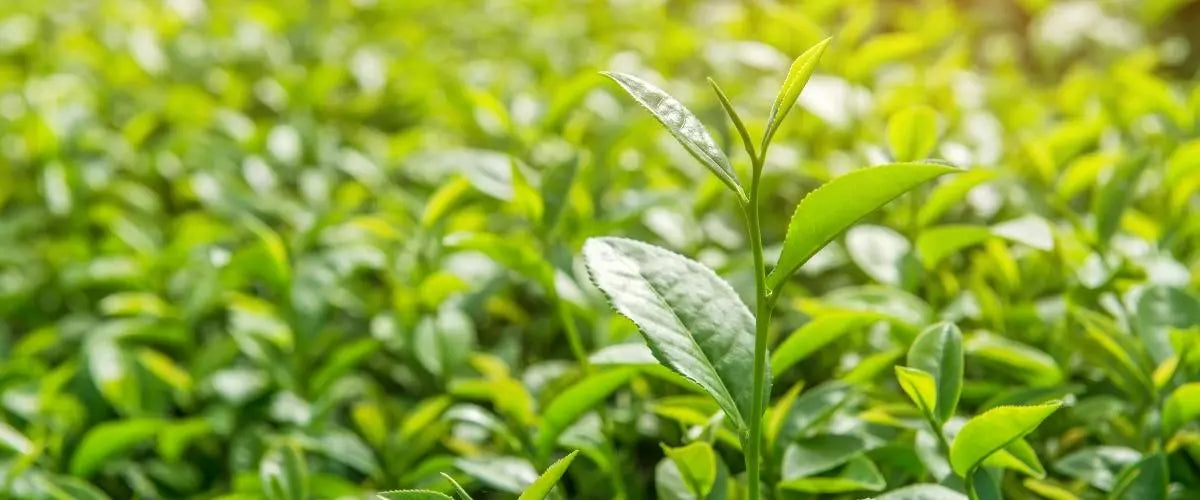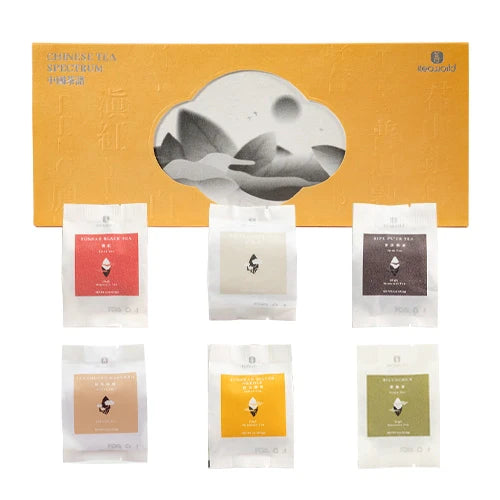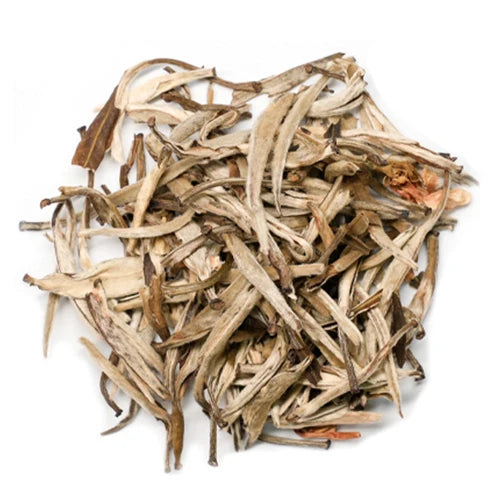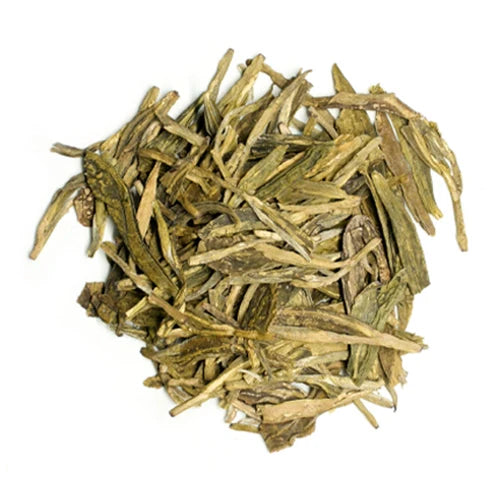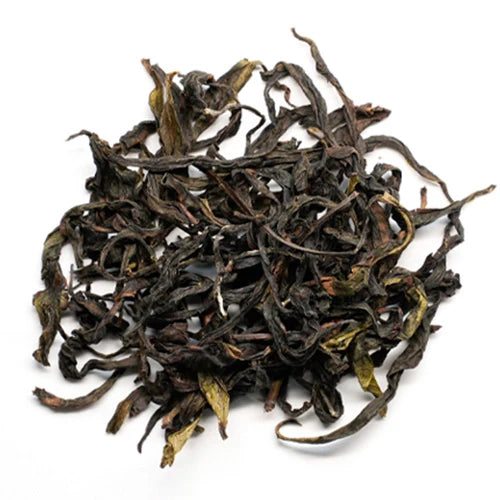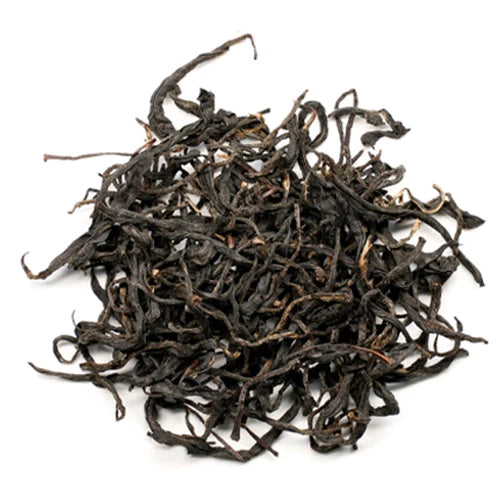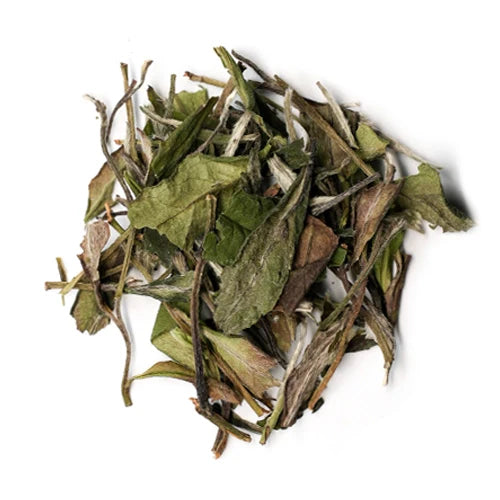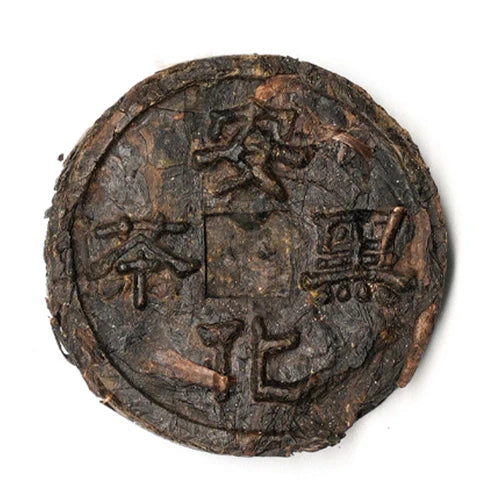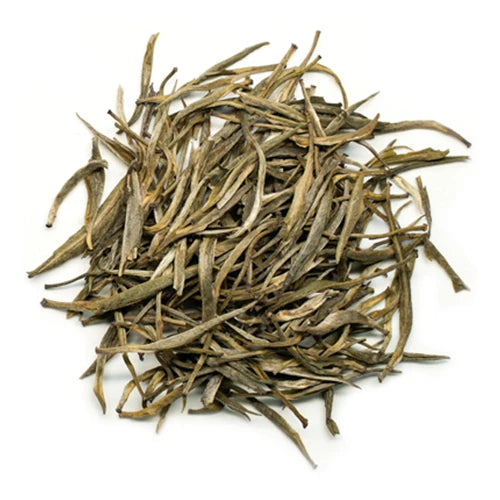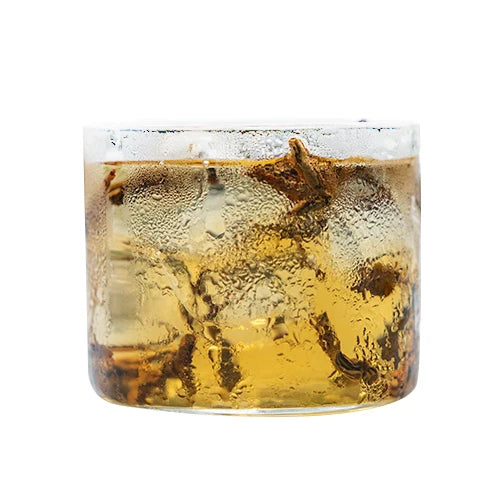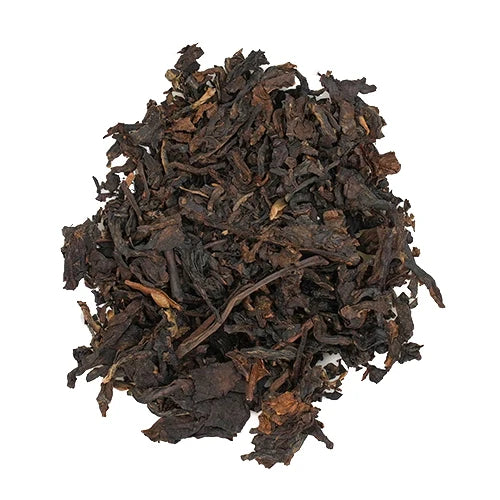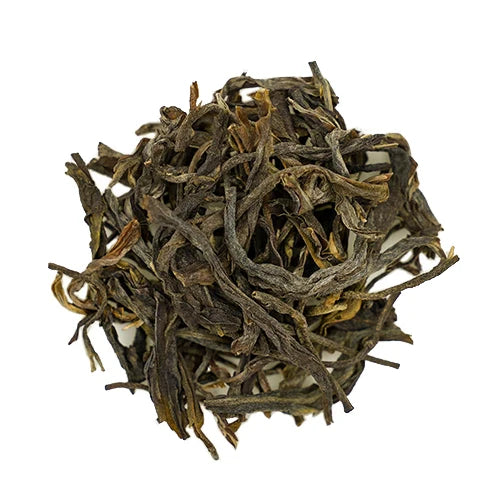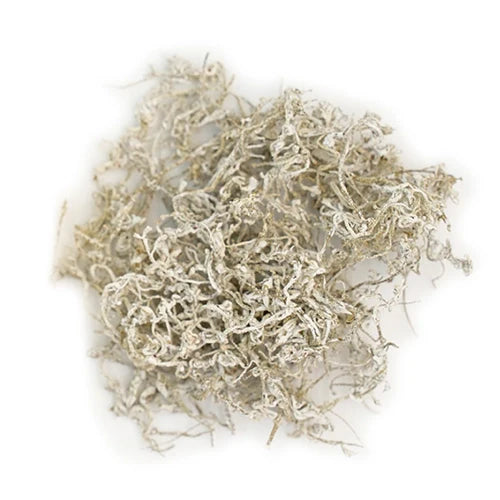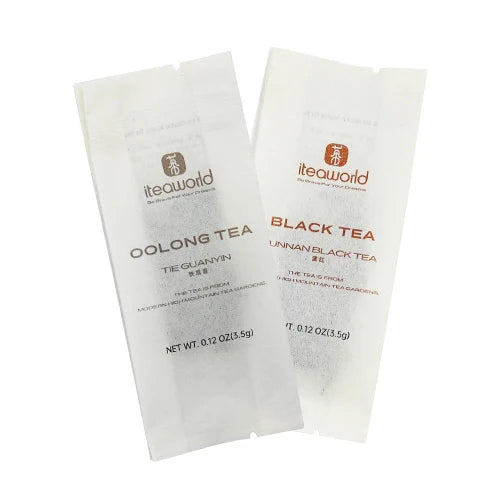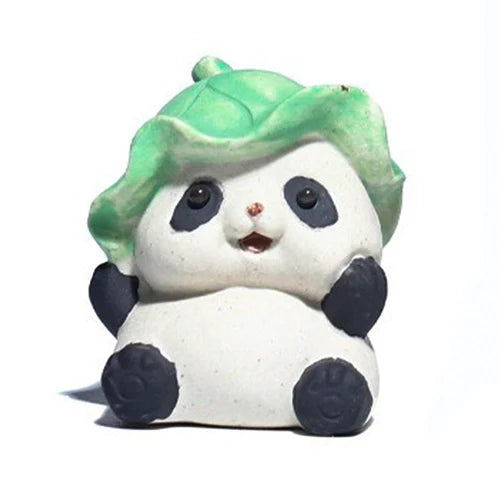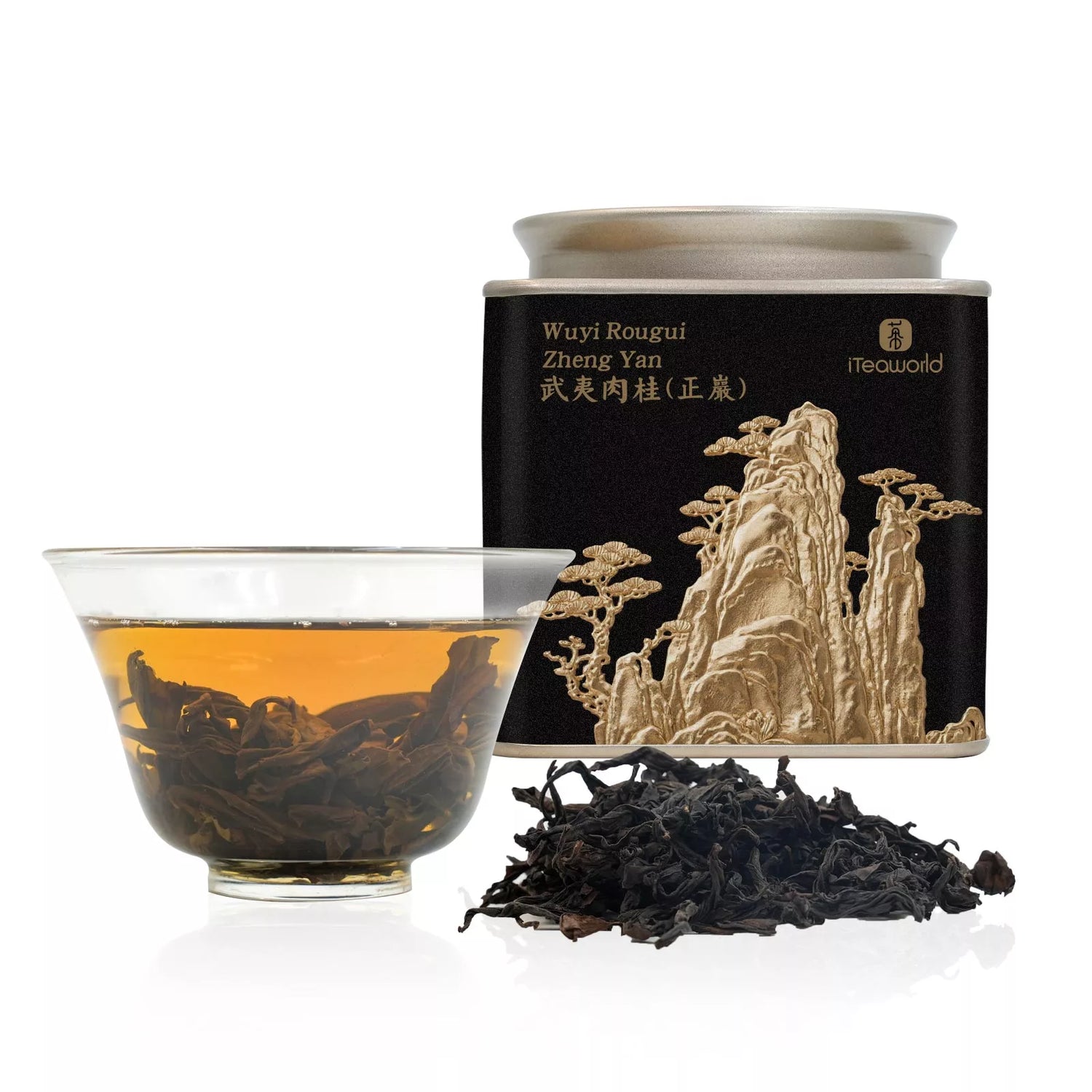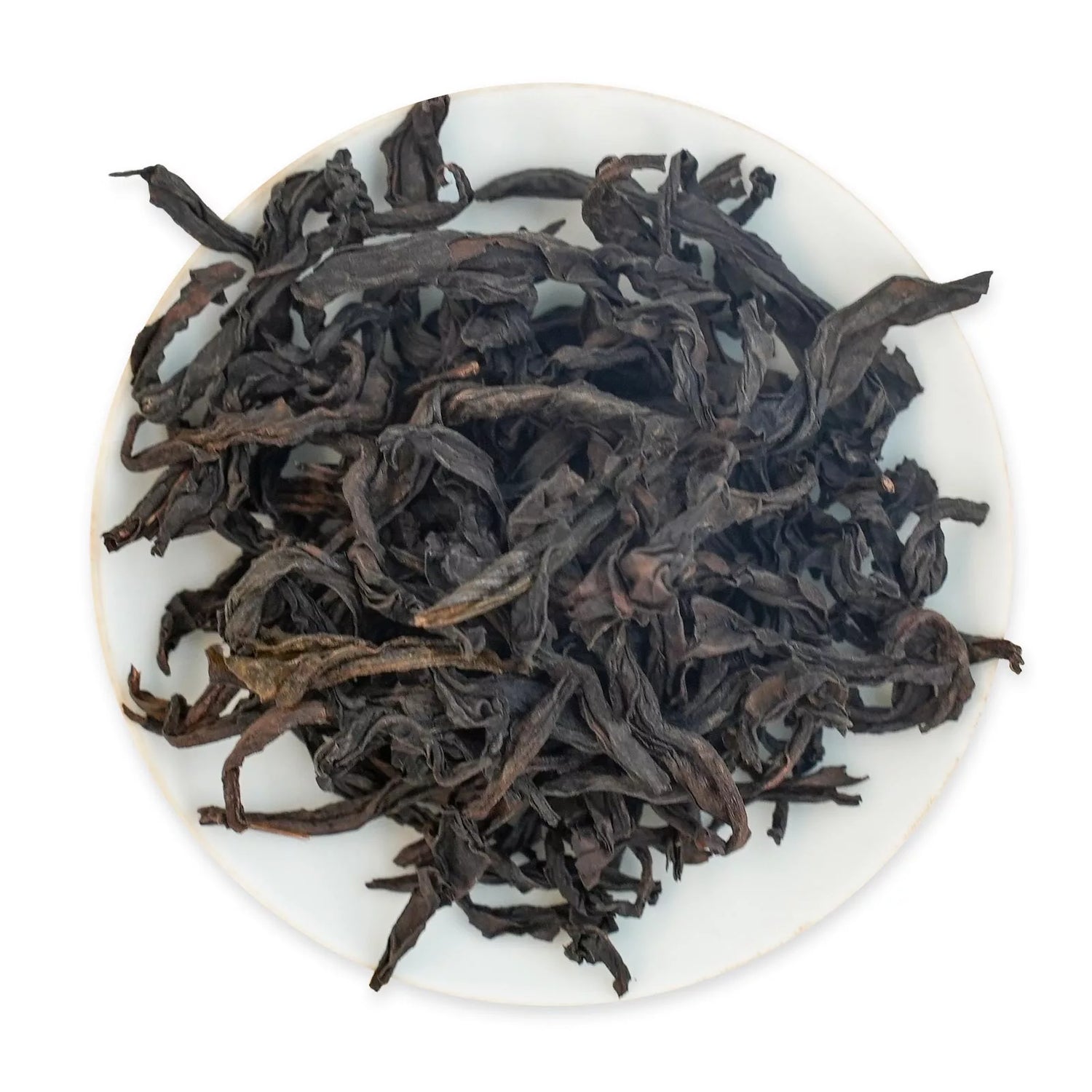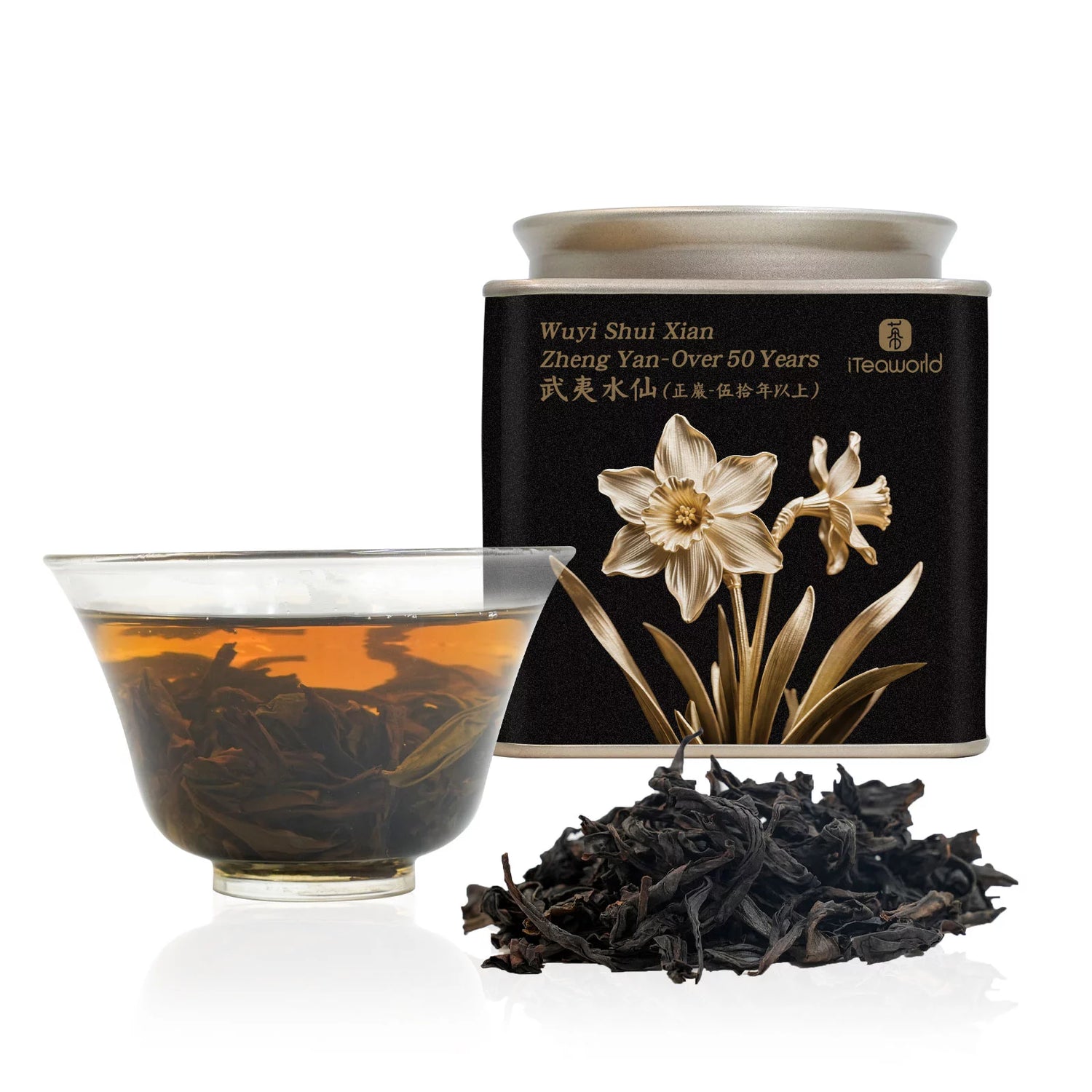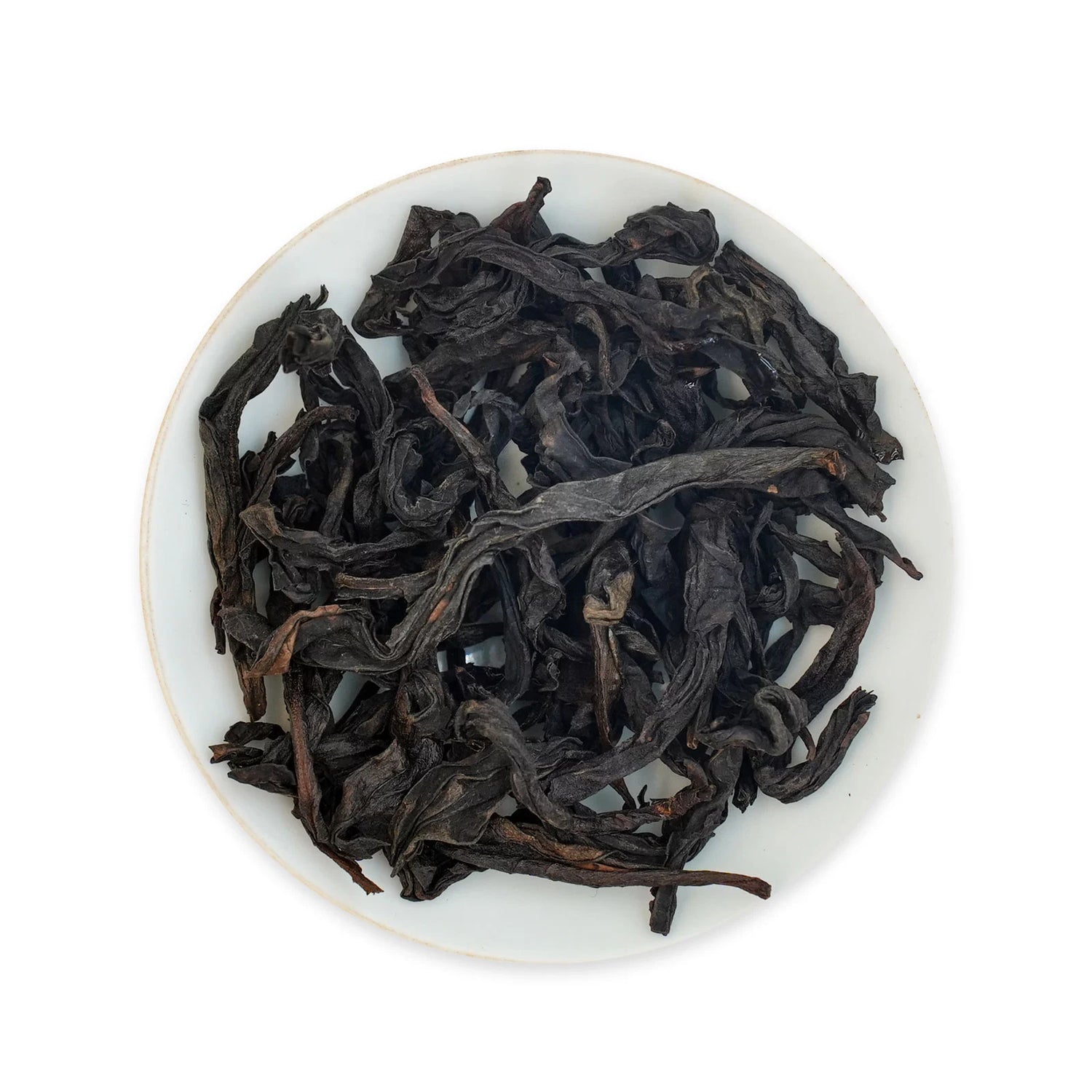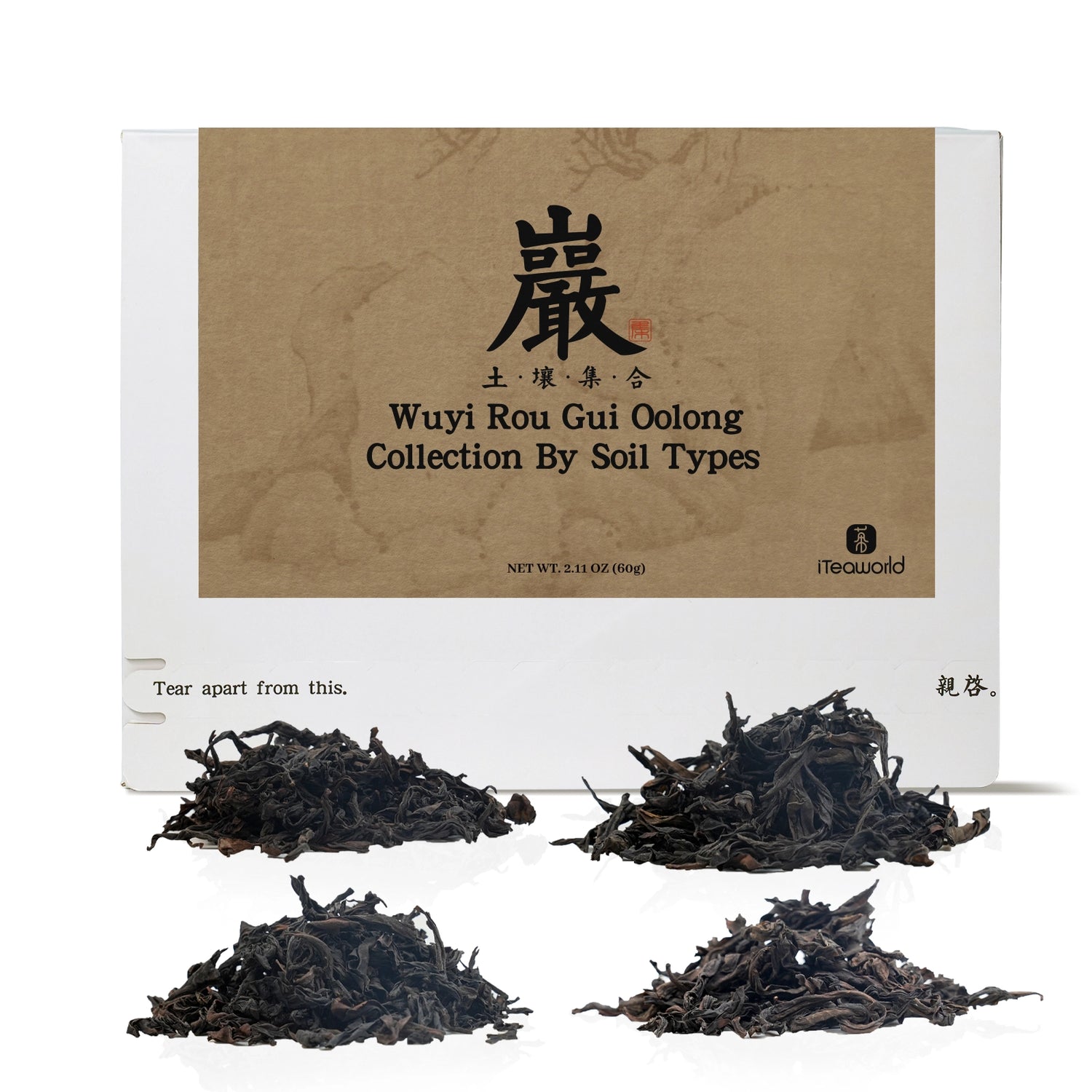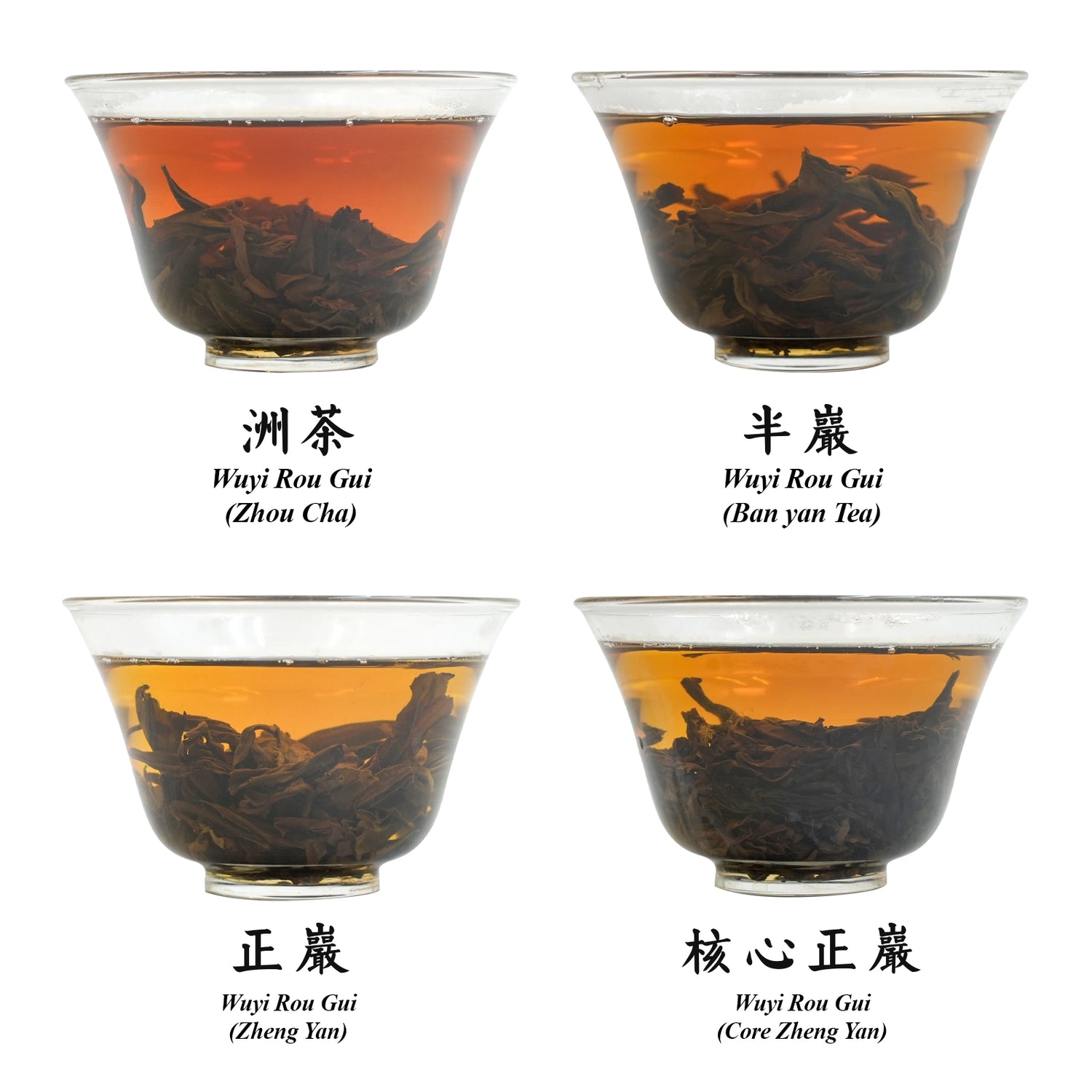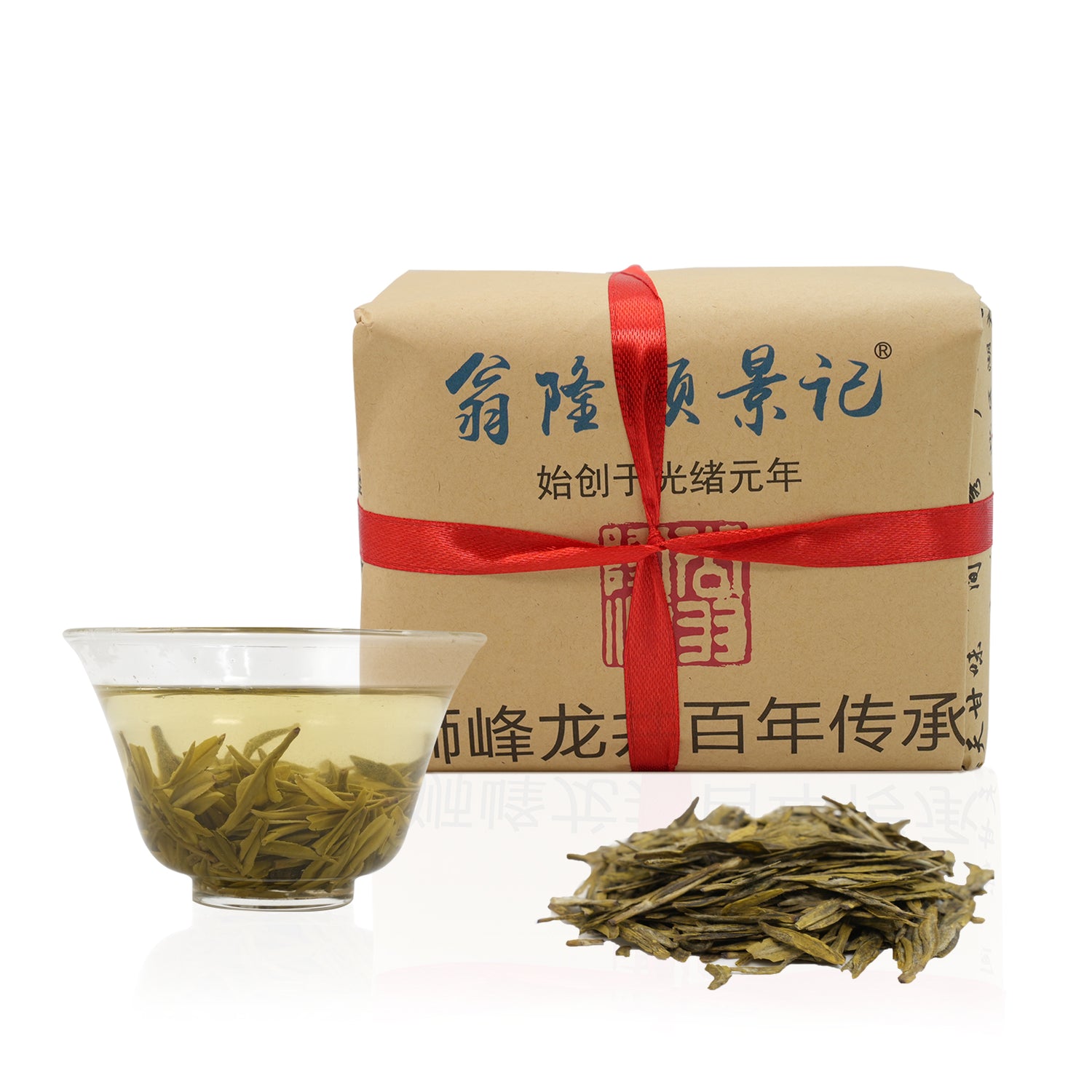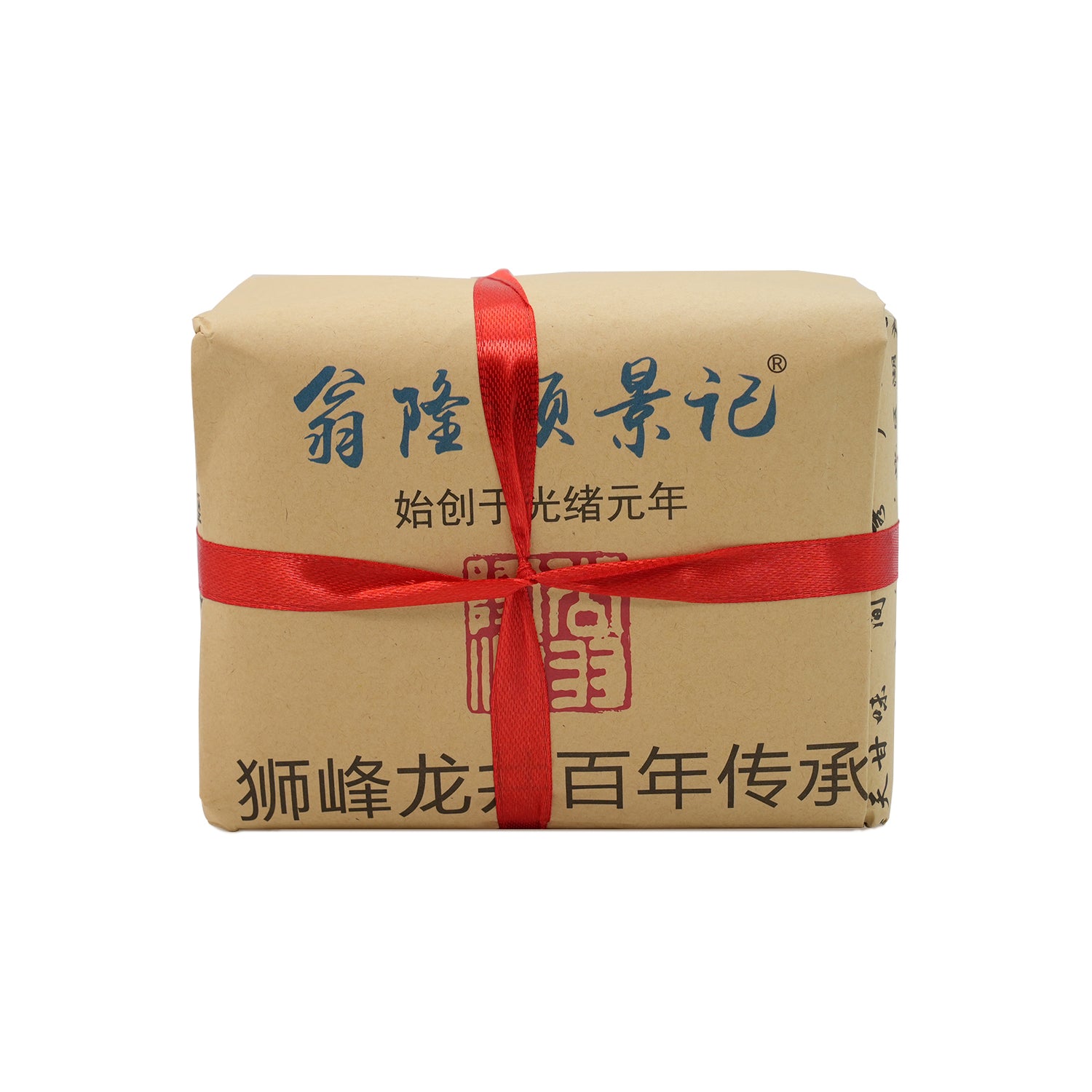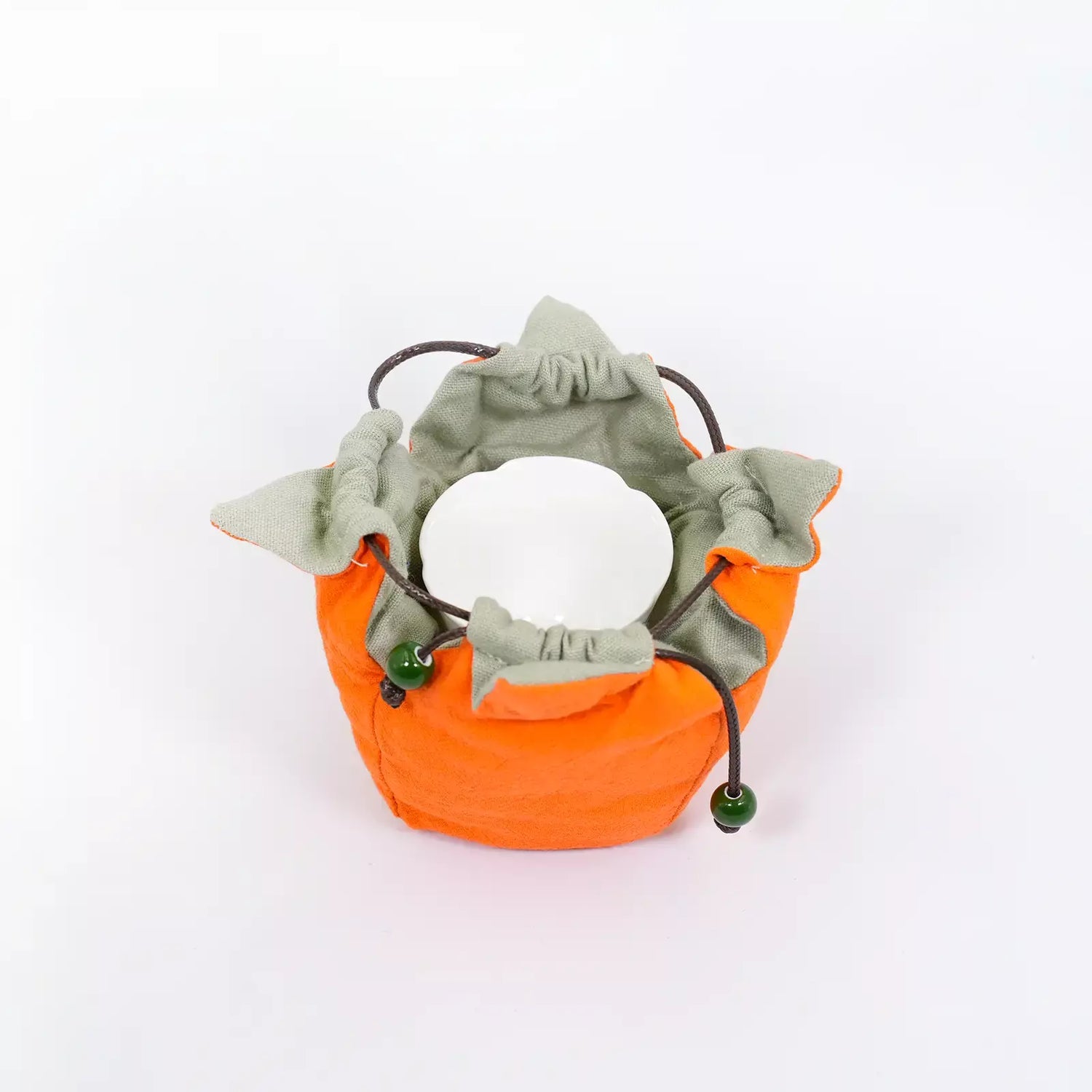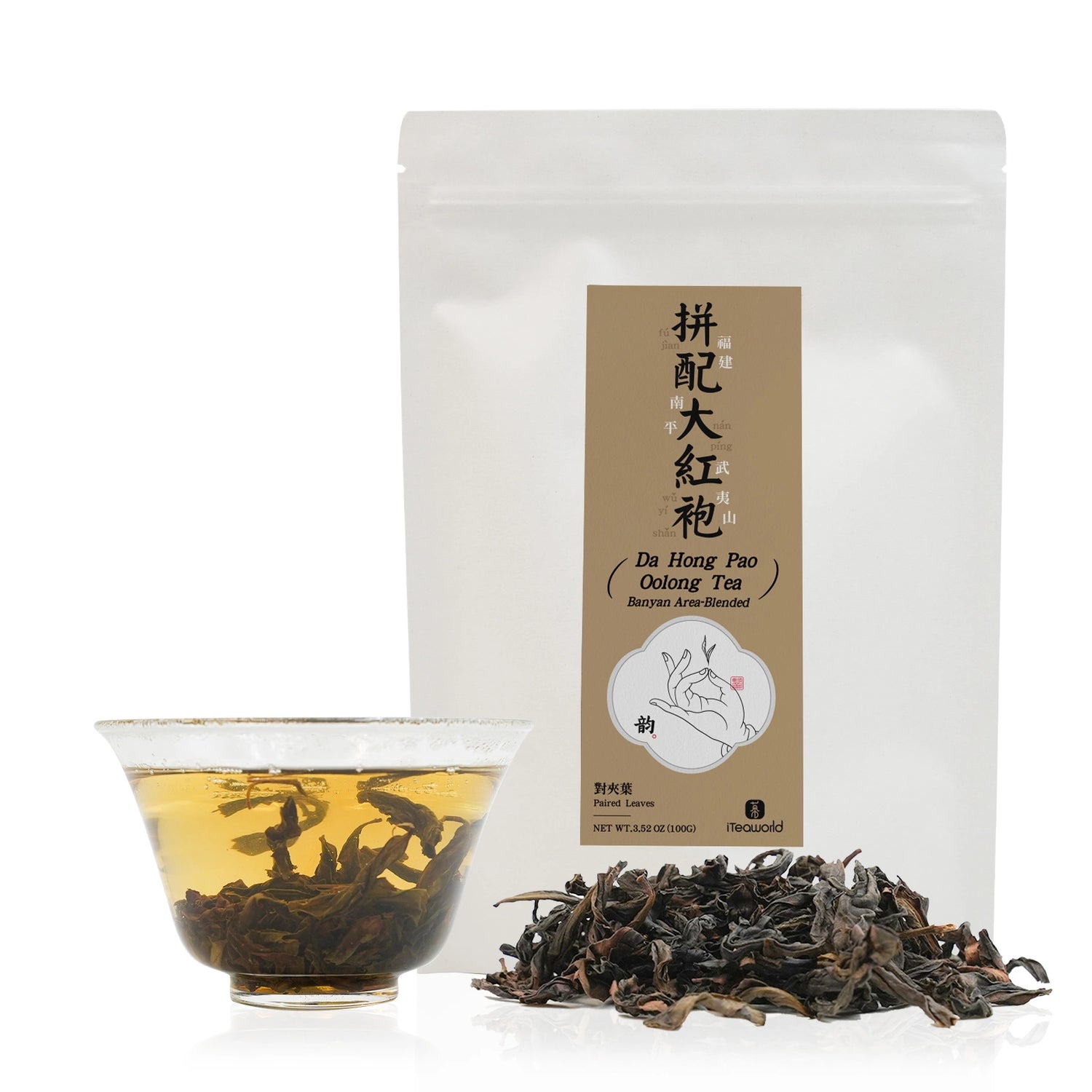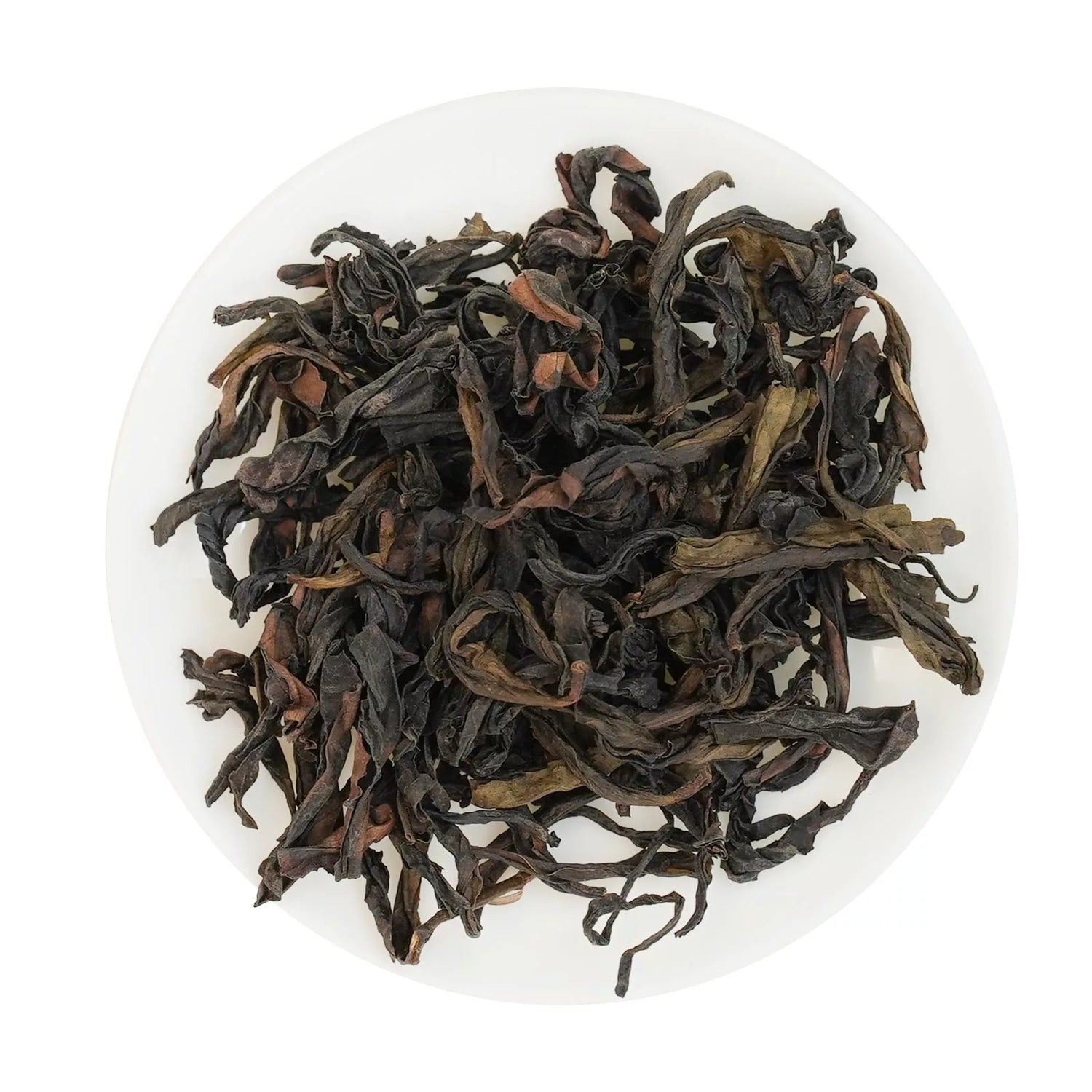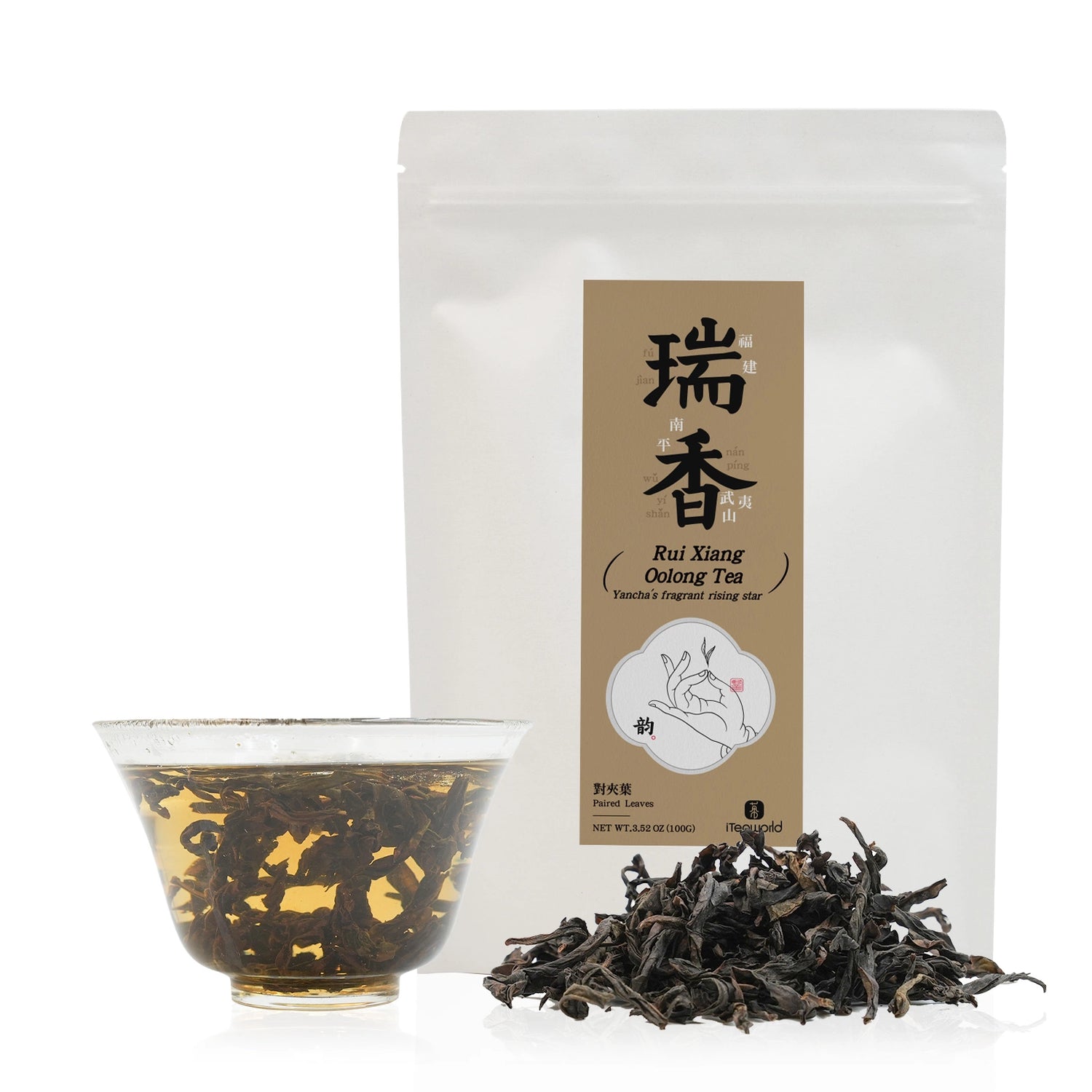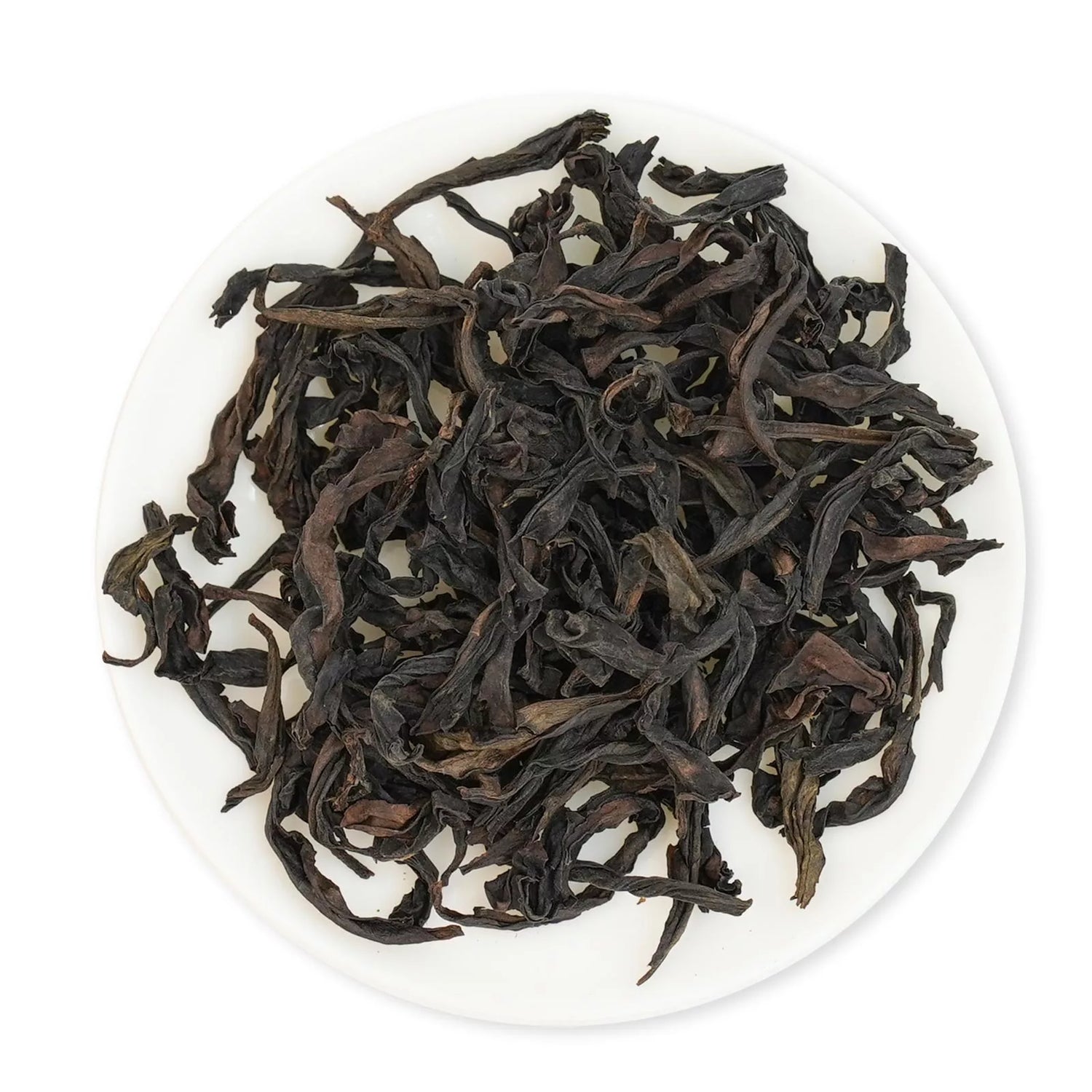Sort by:
204 products
204 products
Wuyi Rougui is one of the most famous varieties of Wuyi Rock Tea, named for its sharp, cinnamon-like aroma.
This Rougui comes from Foguoyan, one of the “Ninety-Nine Famous Rocks” of Wuyi Mountain. Foguoyan is a Zhengyan producing area known for its excellent cost-performance ratio: it offers quality comparable to core Zhengyan teas at a more accessible price. The mineral-rich soil, ample sunlight, and year-round mist create a unique microclimate ideal for tea growth.
The Rougui from Foguoyan features a pronounced rock character with a distinct cinnamon aroma, layered with fruit and floral notes. The liquor is rich, full-bodied, and lingering. Offering core-Zhengyan quality at a better price, this Rougui is perfect for tea enthusiasts looking to explore Wuyi Rock Tea in depth.
Origin: Foguoyan, Xingcun Town, Wuyishan City, Fujian Province, China
Category: Zheng Yan (core rock area)
Soil: Gravel soil
Variety: Wuyi Rou Gui
Producer: Chen Hui
Harvest Time: November 2024
Shelf Life: 36 months
Wuyi Shui Xian is one of the flagship varieties of Wuyi Rock Tea. Together with Rou Gui, it is praised in the saying: “For mellowness, none surpasses Shui Xian; for fragrance, none surpasses Rou Gui.” It was introduced to Wuyi Mountain from Jianyang during the Qing Dynasty.
For Shui Xian, tree age is a defining factor. As the tea trees grow older, the liquor becomes more mellow and rich, bitterness and astringency diminish, and the flavor layers become increasingly complex.
This particular Shui Xian is grown at Yunü Peak, one of the famous Thirty-Six Peaks of Wuyi Mountain, within the Zheng Yan (core rock) area, the most prized origin for Wuyi Rock Tea. Crafted from tea trees over 50 years old, it carries a distinctive woody fragrance, combined with bamboo leaf (zongye) aroma and the characteristic “Cong Wei” (old tree flavor). The mineral-rich Yan Yun (rock rhyme) is especially pronounced. Compared with younger bushes, the liquor is thicker, more full-bodied, and textured, making it an ideal choice for tea lovers seeking to deepen their exploration of Wuyi Rock Tea.
Origin: Yunü Peak, Xingcun Town, Wuyishan City, Fujian Province, China
Tree Age: Over 50 years
Category: Zheng Yan (core rock area)
Soil: Gravel soil
Variety: Wuyi Shui Xian
Producer: Chen Hui
Harvest Time: November 2024
Storage Life: 36 months
Soil Environment
In The Classic of Tea by Lu Yu, it’s mentioned that tea trees grow best in different types of soils: “the best grow in rotten rocks, the middle in gravelly soil, and the worst in yellow earth.” Soil with rocks provides good drainage and airflow, preventing both waterlogging in heavy rain and dryness during droughts. It’s rich in minerals, and tea trees thrive in soil that’s both moist and acidic. For example, the finest Wuyi rock teas grow in soil made up of rotten rocks and gravel. On the other hand, lower-grade Wuyi teas, which mainly grow in yellow earth, lack the signature rocky flavor and have simpler, less complex aromas and tastes.
If you want to experience how different soil types affect the flavor of oolong tea, the best example would be a collection of Wuyi Rock Teas from various environments. This includes:
Core Zhengyan Wuyi Tea: Known for its rocky, gravelly soil, represented by the famous Three Pits and Two Streams (San Keng Liang Jian).
Wuyi Zhengyan Tea: Grown in soils rich in sandy gravel rocks.
Wuyi Ban Yan Tea: Grown in thicker layers of rocky red soil.
Wuyi Zhou Tea: Grown in soils dominated by loess (yellow earth).
Products Included:
- Core Zhengyan Wuyi Tea(Core Zheng Yan)10g
- Wuyi Rou Gui (Zheng Yan) 10g
- Wuyi Rou Gui (Ban yan Tea) 20g
- Wuyi Rou Gui (Zhou Cha) 20g
Origin:
- Core Zheng Yan:Wuyuan Jian, Tianxin Village, Wuyi Town, Wuyishan City, Fujian Province
- Zheng Yan:Tianxin Village, Wuyi Town, Wuyishan City, Fujian Province
- Ban yan Tea:Jingshui Village, Xingcun Town, Wuyishan City, Fujian Province, China
- Zhou Cha:Xingtian Town, Wuyishan City, Fujian Province, China
Master Blender:
- Chen Hui
Processing Time:
- October 2024
Best Before Date:
- 36 months
Tea Variety:
- Wuyi Cinnamon Varieties
Altitude:
- Core Zheng Yan:342 meters
- Zheng Yan:400-500 meters
- Ban yan Tea:about 400 meters
- Zhou Cha: about 200 meters
Soil Type:
- Core Zheng Yan:Gravel Soil
- Zheng Yan:sandy gravelly soil
- Ban yan Tea:red soil dominated by thickly bedded rock
- Zhou Cha: yellow soil
Oxidation Level:Medium oxidation (45-55%)
Roasting Level:
- Core Zheng Yan:Three roasts, heavy fire, 105-110°C (221-230°F)
- Zheng Yan:Three roasts, heavy fire, 105-110°C (221-230°F)
- Ban yan Tea:Three roasts, heavy fire, 105-110°C (221-230°F)
- Zhou Cha: Two roasts, medium-heavy fire, around 115°C (239°F)
Roasting Method (Charcoal or Electric):
- charcoal briquetting
Brewing Recommendations:
Chinese-Style Oolong Brewing
Teaware: Gaiwan or clay teapot
Water Temp: 212°F (100°C)
Tea-to-Water Ratio: 1g per 0.7 oz (20ml)
Steep Time: 15 sec (1-3 steeps), add 5-10 sec after
Re-Steep: Up to 7 times
Western-Style Oolong Brewing
Teaware: Teapot, infuser, or French press
Water Temp: 212°F (100°C)
Tea-to-Water Ratio: 1 tsp (2-3g) per 8 oz (240ml)
Steep Time: 3 minutes
Re-Steep: 3 times, adding 1 minutes each time
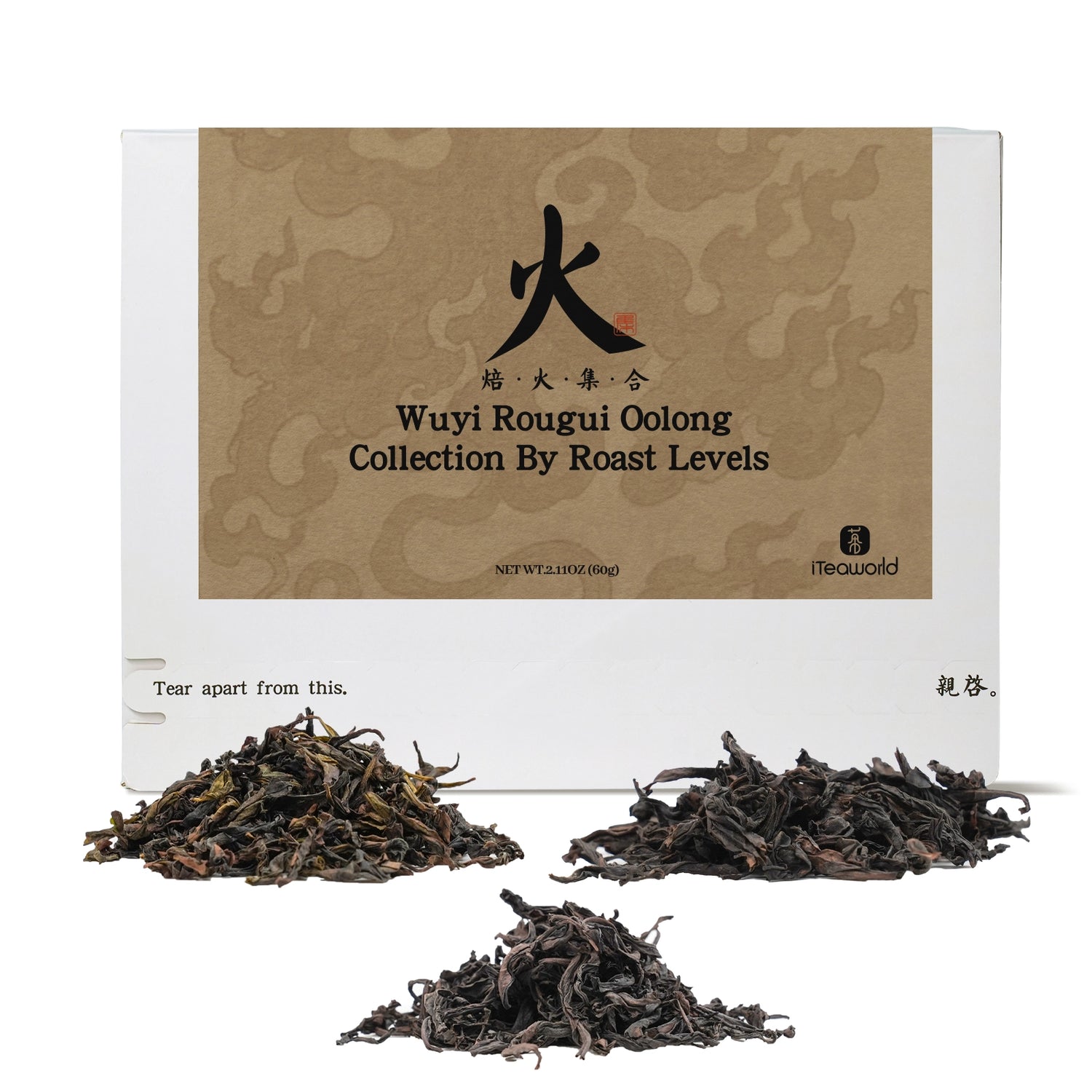
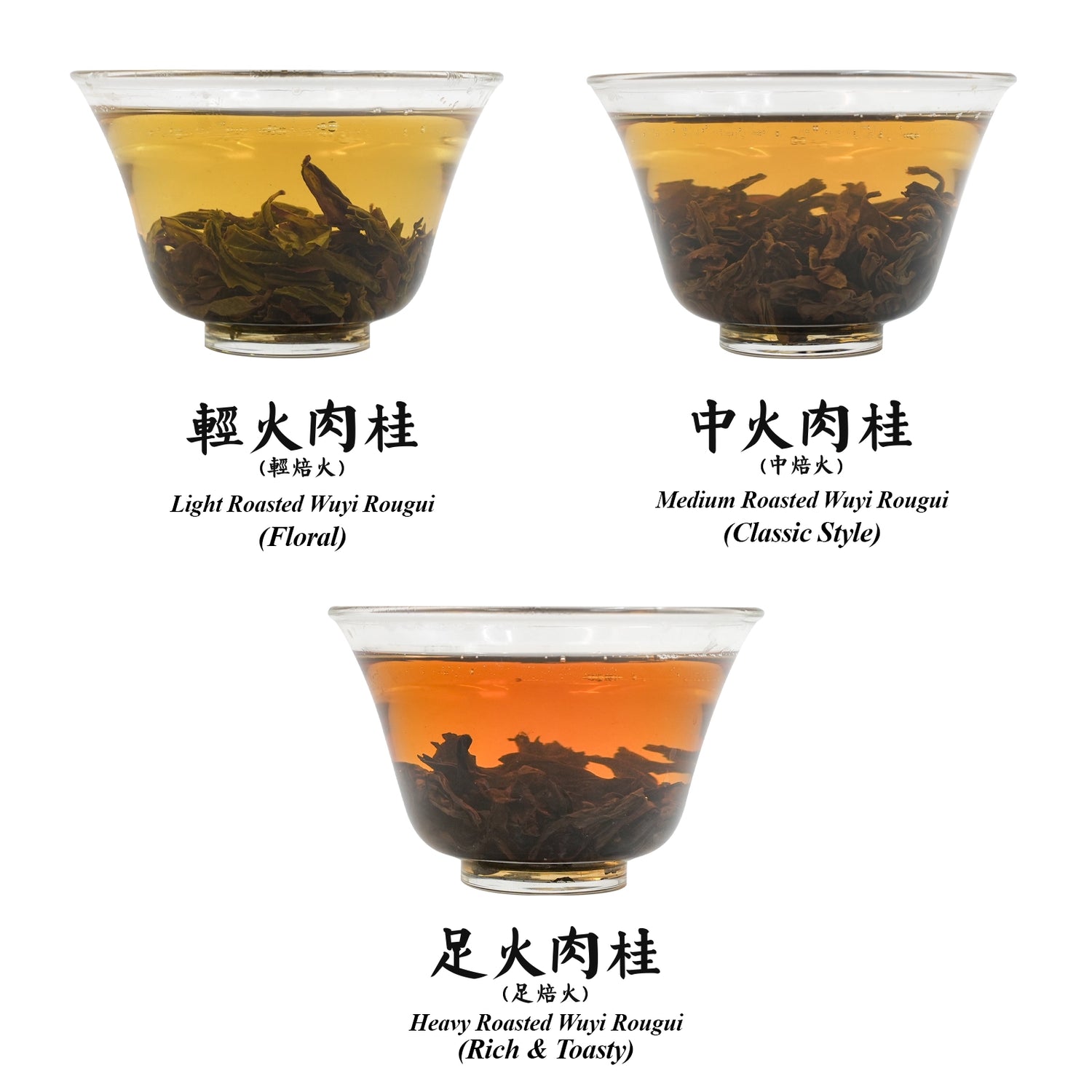
Wuyi Oolong Comparison Set: 3 Roast Levels (Light to Heavy Fire) 60g
Wuyi Oolong Comparison Set: 3 Roast Levels (Light to Heavy Fire) 60g
The Art of Roasting Oolong Tea
Roasting oolong tea serves three key purposes: reducing moisture, removing any off-flavors, and lowering caffeine content, all while enhancing the tea's aroma and flavor.Teas with different oxidation levels need different roasting levels. Usually, lightly oxidized teas are lightly roasted to enhance their flavor. If a tea is lightly oxidized but heavily roasted, it can taste too smoky, often because the oxidation wasn’t done properly and the roasting is used to cover it up.
The level of roasting significantly impacts the tea’s aroma and taste. Light roasting preserves the fresh, floral fragrance, while heavy roasting creates a richer, smoother brew with toasty or smoky undertones.
This tea features Wuyi Rougui oolong from the renowned Wuyi Mountains in Fujian, crafted by the same tea master. The only difference lies in the roasting level, offering you an excellent opportunity to explore how roasting shapes the flavors of oolong tea.
Origin:Jingshui Village, Xingcun Town, Wuyishan City, Fujian Province, China
Master Blender:Chen Hui
Processing Time:November 2024
Best Before Date:24 months
Tea Variety:Wuyi Cinnamon
Altitude:about 400 meters
Soil Type:gravelly soil
Oxidation Level:Oxidization 45-55%
Roasting Level:Single Roast: Light roast, 90-100°C (194-212°F)
Triple Roast: Medium roast, 105-115°C (221-239°F)
Triple Roast (Full Fire): Heavy roast, 120-130°C (248-266°F)
Roasting Method (Charcoal or Electric):
Light cinnamon: electric roasting 20g
Medium fire cinnamon: charcoal briquetting 20g
Full Flame Cinnamon: charcoal briquetting 20g
Brewing Recommendations:
Chinese-Style Oolong Brewing
Teaware: Gaiwan or clay teapot
Water Temp: 212°F (100°C)
Tea-to-Water Ratio: 1g per 0.7 oz (20ml)
Steep Time: 10-15 sec (1-3 steeps), add 5-10 sec after
Re-Steep: Up to 7 times
Western-Style Oolong Brewing
Teaware: Teapot, infuser, or French press
Water Temp: 190-200°F (88-93°C)
Tea-to-Water Ratio: 1 tsp (2-3g) per 8 oz (240ml)
Steep Time: 3-5 minutes
Re-Steep: Up to 3 times, adding 1-2 minutes each time
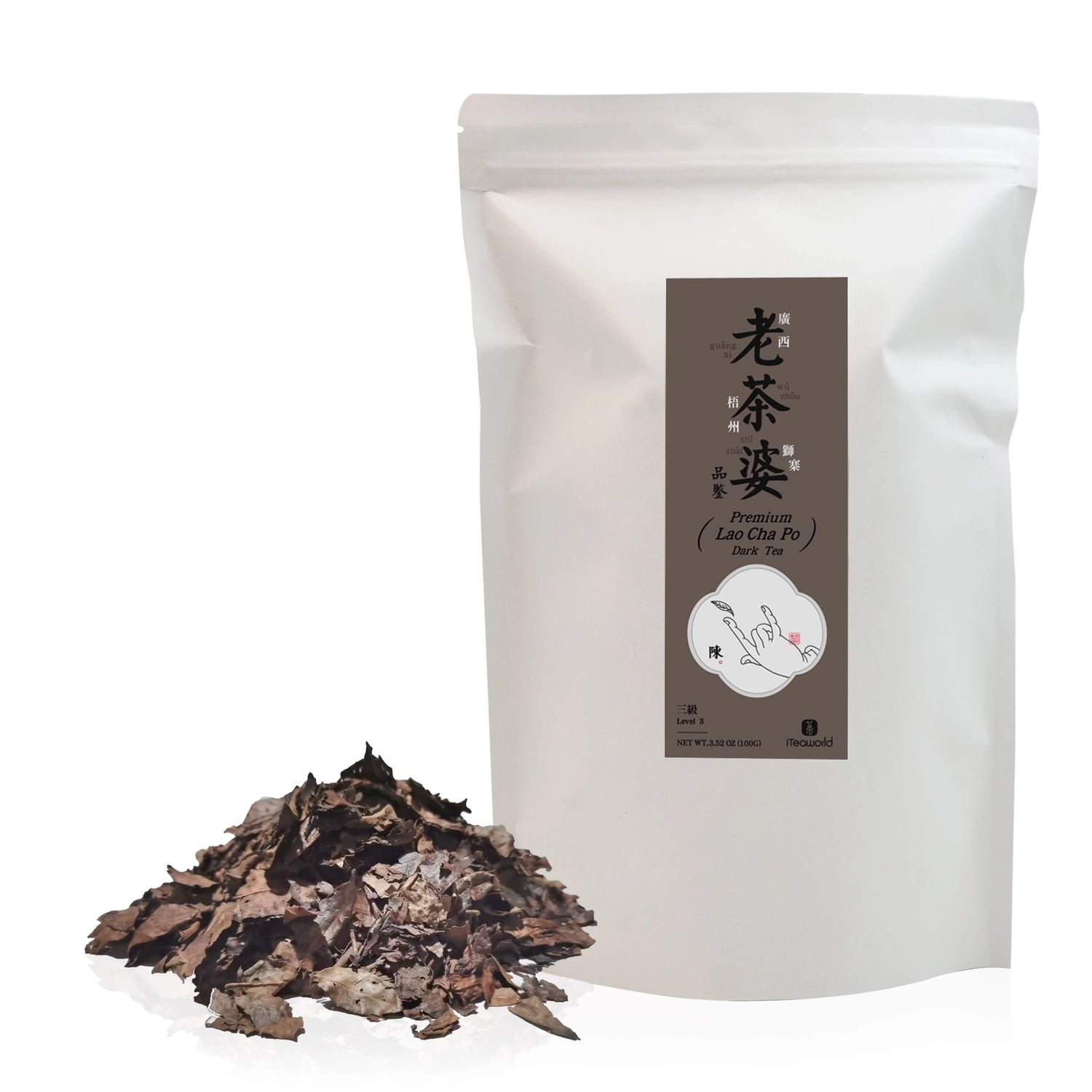
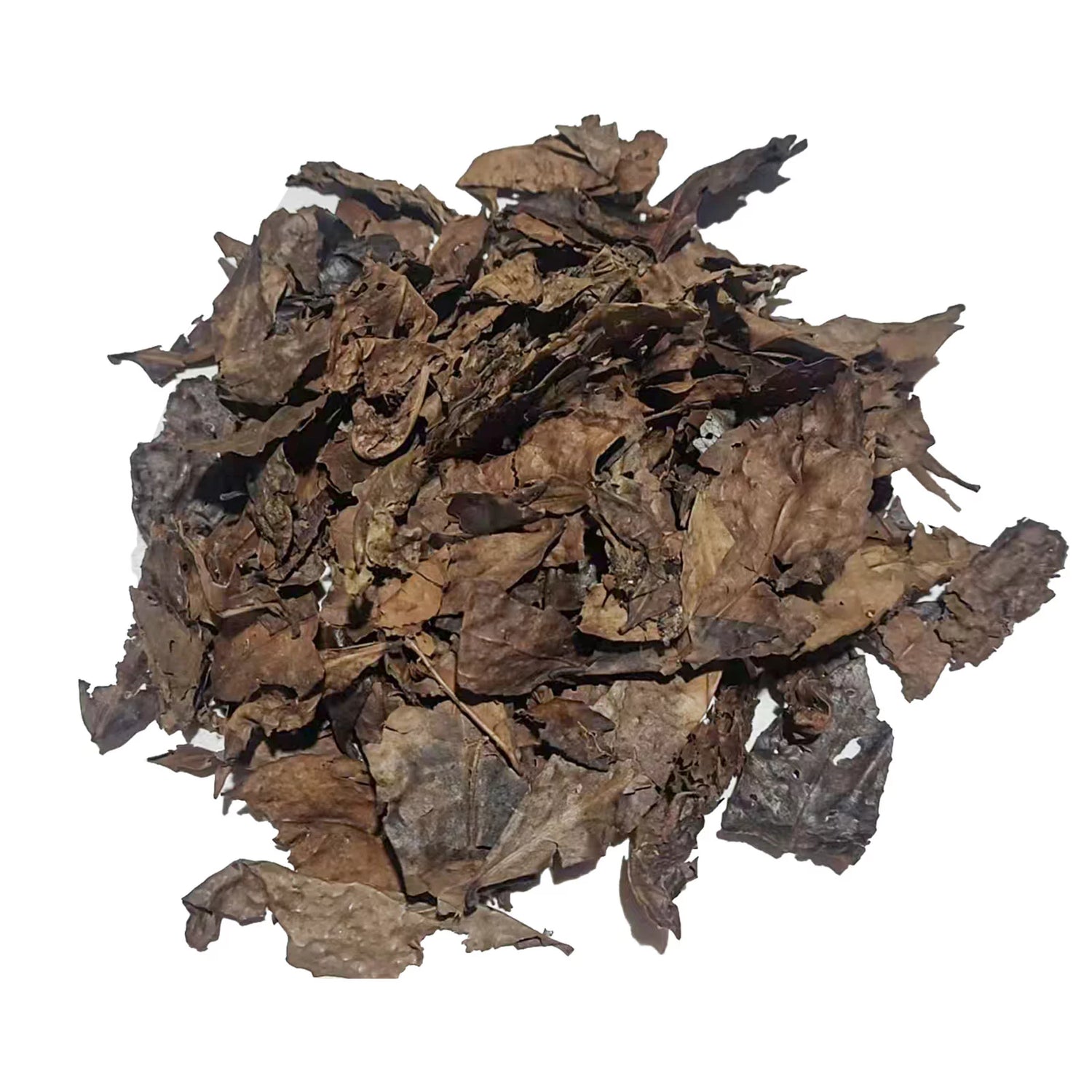
Lao Cha Po Liubao Dark Tea – Aged 2010, Wild Old Trees, Smooth & Sweet
Lao Cha Po Liubao Dark Tea – Aged 2010, Wild Old Trees, Smooth & Sweet
“Lao Cha Po” specifically refers to old leaves (not tender buds) harvested one week before and after Shuangjiang (one of China’s 24 solar terms, around October 23, marking the start of colder weather). These are mostly coarse leaves from the current year or 2–3-year-old growth. “Cha Po” is the Liubao people’s respectful name for old leaves. In the past, farmers sold tender buds as high-quality tea, while coarse old leaves were kept as everyday tea. The name reflects the farmers’ wisdom of “making full use of what you have.”
Around Shuangjiang, large temperature differences and reduced rainfall make the old leaves thicker and richer in sugars and nutrients, giving the tea a natural cane sugar sweetness. Tea harvested at this time has less astringency and a smoother, naturally sweet taste.
This Lao Cha Po tea was brewed at the tea bar during the 15th Northwest Tea Festival and loved by everyone, receiving high praise.
This tea is made using the traditional Liubao “picking and cleaning old leaves” method: fresh leaves are briefly blanched in hot water, then sun-dried or air-dried. Blanching reduces bitterness, while the drying process, similar to white tea, preserves most of the tea’s natural compounds.
This batch of Lao Cha Po comes from wild, aged tea trees in Shizhai Town, Wuzhou City, with tree ages of 30–50 years, making the raw material rare. Because it uses old trees, even with only 20 years of aging, the tea exhibits flavor comparable to 30+ years aged tea. The tea has a distinct medicinal aroma and carries the forest-like character unique to old trees, offering a rich and unique flavor.
Recommended Purchase :
This Tie Guan Yin Oolong tea, produced between 1990 and 1993, has been stored in a dry warehouse of an old tea factory for over thirty years and kept sealed. It is made from the Tie Guan Yin variety from the famous tea-growing region of Yongchun, Fujian, and was crafted by the state-owned Yongchun Kong Overseas Chinese Tea Factory, established in 1958. This tea is entirely handmade, traditionally roasted over a full fire, and comes in its original packaging. No longer available on the market, its unique "aged aroma," rich sweetness, and smooth texture make it a prized choice for connoisseurs of aged oolong tea.
Key Details about Tieguanyin :
- Production Date:1990-1993
- Grade: First grade
- Tea Cultivar: Tieguanyin
- Craftsmanship: This tea is traditionally roasted with a full fire and moderately oxidized. After over thirty years of natural aging in a dry storage environment, it is sealed in an outer paper box and packaged in an inner kraft paper bag.
- Flavor Highlights: This tea offers a rich, aged aroma with hints of woody notes. The texture is thick and smooth, with a deep, mellow flavor and a long-lasting sweet aftertaste. Its complex profile unfolds in layers, making it a truly refined experience.
What is Tieguanyin Oolong Tea? :
Tieguanyin is one of China's top ten famous teas, a semi-fermented oolong tea primarily produced in Anxi, Fujian. Its unique production process includes sun-withering, shaking, and heating, which gives the leaves a distinctive "green leaf with red edges" appearance. The tea features tightly rolled, sandy-green leaves and a golden, clear brew. It has a rich, lasting aroma with natural orchid or fruity notes, a smooth, refreshing taste, and a sweet aftertaste. Highly resistant to multiple infusions, Tieguanyin is packed with nutrients like polyphenols and amino acids, offering benefits such as boosting alertness, reducing fatigue, cooling the body, and aiding weight loss. A treasured tea and a symbol of Southern Fujian's tea culture, it is widely loved by tea enthusiasts.
Brewing and Enjoyment Tips :
This tea showcases the unique transformation brought by time. The first infusion can be used as a "tea awakening" step to activate the tea's inner qualities, resulting in a richer, smoother texture and a more pronounced sweet aftertaste. For the best experience, we recommend using longer steeping times or boiling methods to fully unlock its aged characteristics.
Recommended Brewing Methods :
-
Gaiwan Brewing
- Capacity:100ml Gaiwan
- Water Temperature:95℃-100℃
- Brewing Times:5-7 times
- Tea Water Ratio:1:15 to 1:25
- Brewing Time Once:10~20 seconds
-
Thermos Brewing
- 1g tea per 100ml (3.4oz) water.
- Use boiling water (212°F).
- Steeping Time: 1-2 hours.
- Tool: Insulated thermos.
-
Boiling Method
- Add 1g tea per 100ml (3.4fl oz) water.
- Boil for 1-2 minutes, then let sit for 2-3 minutes.
- Rebrew by boiling for 3 minutes longer with each steeping.
- Use a ceramic or glass teapot for optimal flavor.
- Enjoy up to 3-4 brews.
Storage Guidelines:
To ensure the best quality of tea, the ideal way to store it is in vacuum-sealed packaging, kept in a cool, dark, and dry place. Avoid exposure to strong odors and air. For sealed storage, using a tin can or a double-lidded metal can is recommended. For even better results, you can store the sealed tea in the refrigerator or a dry storage container.
Weight & Packaging
- Weight:3.5oz (100g)
- Packing Type : Sealed paper box with cowhide bag packaging inside
About Yongchun Beikeng Overseas Chinese Tea Factory:
Established in 1958, the state-owned Fujian Yongchun Beikeng Overseas Chinese Tea Factory carries a rich history and cultural heritage of tea production. At its peak, the factory was a bustling hub of innovation and craftsmanship, employing over 1,000 tea workers and producing millions of pounds of tea annually. Its teas, including Tieguanyin, were exported to Hong Kong, Taiwan, Japan, and Southeast Asia, earning widespread acclaim and becoming a shining symbol of Fujian's tea culture.
However, by the 1990s, the factory fell into decline, and its once-vibrant grounds grew quiet. Unable to bear seeing his life's work fade away, the veteran factory director, Huang Shenghou, took over after its privatization, dedicating himself to reviving the factory and preserving its tea-making legacy.
Today, the factory's aged Tieguanyin not only embodies decades of tea-making expertise but also continues to showcase the timeless charm of Yongchun's Tieguanyin. The story of the Fujian Yongchun Beikeng Overseas Chinese Tea Factory reflects the dedication and innovation of generations of tea artisans, and its aged Tieguanyin carries forward this remarkable legacy.
In China, top-grade Longjing tea comes exclusively from the core West Lake production area, with the most authentic variety, ideally picked early in spring as bud tips or one bud and one leaf to be considered the crème de la crème of Longjing.
This product is among the finest Longjing teas. We've sourced it from the inheritor of the Longjing intangible cultural heritage, Master Weng Liwen, a tea master from the century-old Wengjiashan tea estate, and a national first-class tea appraiser. This pre-rain Longjing is hand-picked and pan-fried by Master Weng, featuring the Longjing No. 43 variety. It's a handcrafted Longjing tea, harvested early on March 26, 2024. For those who wish to experience the authentic, top-tier West Lake Longjing crafted by a master, this tea is a must-try.
Weng Liwen
Weng Liwen is the inheritor of the century-old Weng Longshun Jingji Tea Estate in Wengjiasahn, the core production area of Shifeng Longjing, and he is also a national first-class tea appraiser.
He is closely associated with the craftsmanship of making West Lake Longjing tea and is one of the inheritors of this traditional craft. Weng Liwen has profound experience in tea making; he not only personally participates in the picking and frying of tea leaves but also is committed to teaching and promoting this craft to ensure the traditional flavor of West Lake Longjing tea continues.
Weng Liwen pays special attention to the manual frying of tea leaves in the tea-making process. He believes that the taste and quality of hand-fried tea are far superior to machine-made tea. He emphasizes that each step requires the tea maker to use their five senses, and the tea maker's gaze, judgment, and the warmth of their hands during the manual tea-making process are irreplaceable. Weng Liwen also mentioned that although machine frying is a trend in Longjing tea production, hand-made tea still has its unique value and significance.
Weng Liwen says, "Every tea maker has their own techniques and criteria for judgment. Personally, I believe that 'without floral fragrance, it's not Longjing.' Although floral fragrance, especially the orchid scent we pursue, is something that can be encountered but not sought.


Chinese Style Hand-Embroidered Fish Coasters – Set of 4 Elegant Tea Cup Mats
Chinese Style Hand-Embroidered Fish Coasters – Set of 4 Elegant Tea Cup Mats
The coasters are mainly made of cloth, designed to prevent cups and Yixing teapots from bumping against the table. When you place the cup back, it makes little to no sound, creating a softer and quieter tea-drinking atmosphere.
The fabric is absorbent, allowing you to easily wipe off any water or tea stains from the teapot or cup, keeping the table clean and dry. Most coasters and mats also feature elegant patterns or unique shapes, making them lovely decorative pieces for a tea table or tearoom.
Sizes:
Hand-embroidered Coaster – Fish: 9.5 × 9.5 cm
*All sizes are measured by hand, and a margin of error of ±1 cm may occur.


Chinese Style Hand-Painted Tea Mat – Oriental Aesthetic Teaware Table Mat
Chinese Style Hand-Painted Tea Mat – Oriental Aesthetic Teaware Table Mat
As an essential decoration on the tea table, a tea mat helps organize teaware such as teapots and cups, bringing them together into a harmonious setting. It sets the tone for the tea experience—whether tranquil, elegant, or lively. Placed on the table, it also helps prevent direct contact between teaware and the surface, offering cushioning and anti-slip protection.
The tea towel, usually square or rectangular, is an important cleaning tool during tea preparation. It’s used to wipe the teapot, teacups, or any water stains on the tea mat, keeping the tea space neat and graceful
We offer a variety of styles and colors for both tea mats and tea towels. Each design—whether hand-painted or hand-embroidered—is carefully crafted with attention to detail.
Sizes:
Hand-painted Tea Mat – Lotus Pod Design: 49 × 29 cm
Hand-painted Tea Mat – Butterfly & Flower Design: 49 × 29 cm
Hand-painted Tea Mat – Free Spirit Landscape Design: 49 × 29 cm
Hand-painted Tea Mat – Fish & Lotus Design: 49 × 29 cm
*All sizes are measured by hand, and a margin of error of ±1 cm may occur.
These bag are specially designed to protect your teaware. Each bag is lined with soft padding that provides full cushioning and protection for teapots and cups, preventing damage from accidental bumps during handling or storage.
These teaware bags are perfect for both home storage and travel, offering reliable protection for your favorite teaware wherever you go.
Sizes:
Persimmon Cup Bag – Orange: 6 cm (L) × 5.5 cm (W) × 8 cm (H)
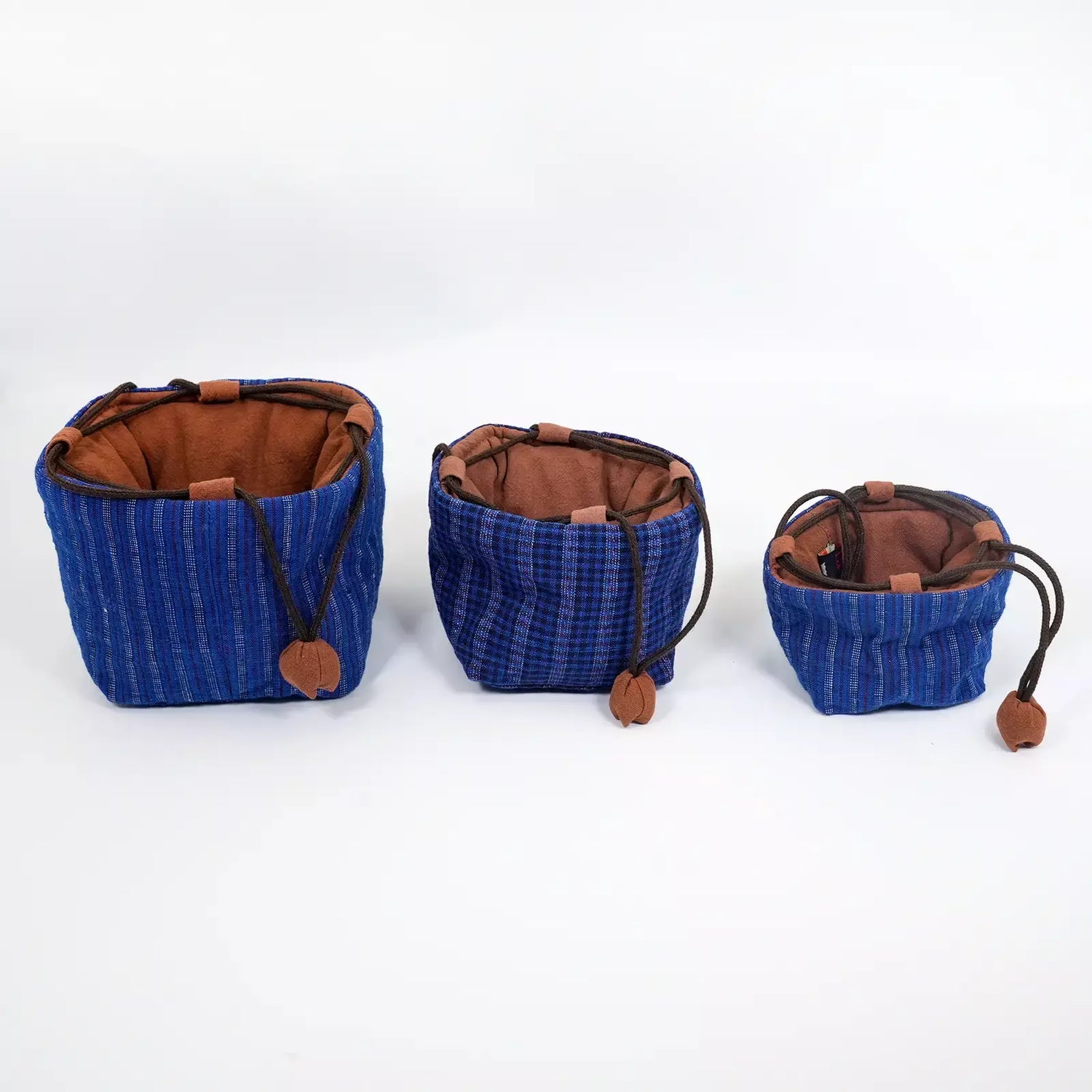
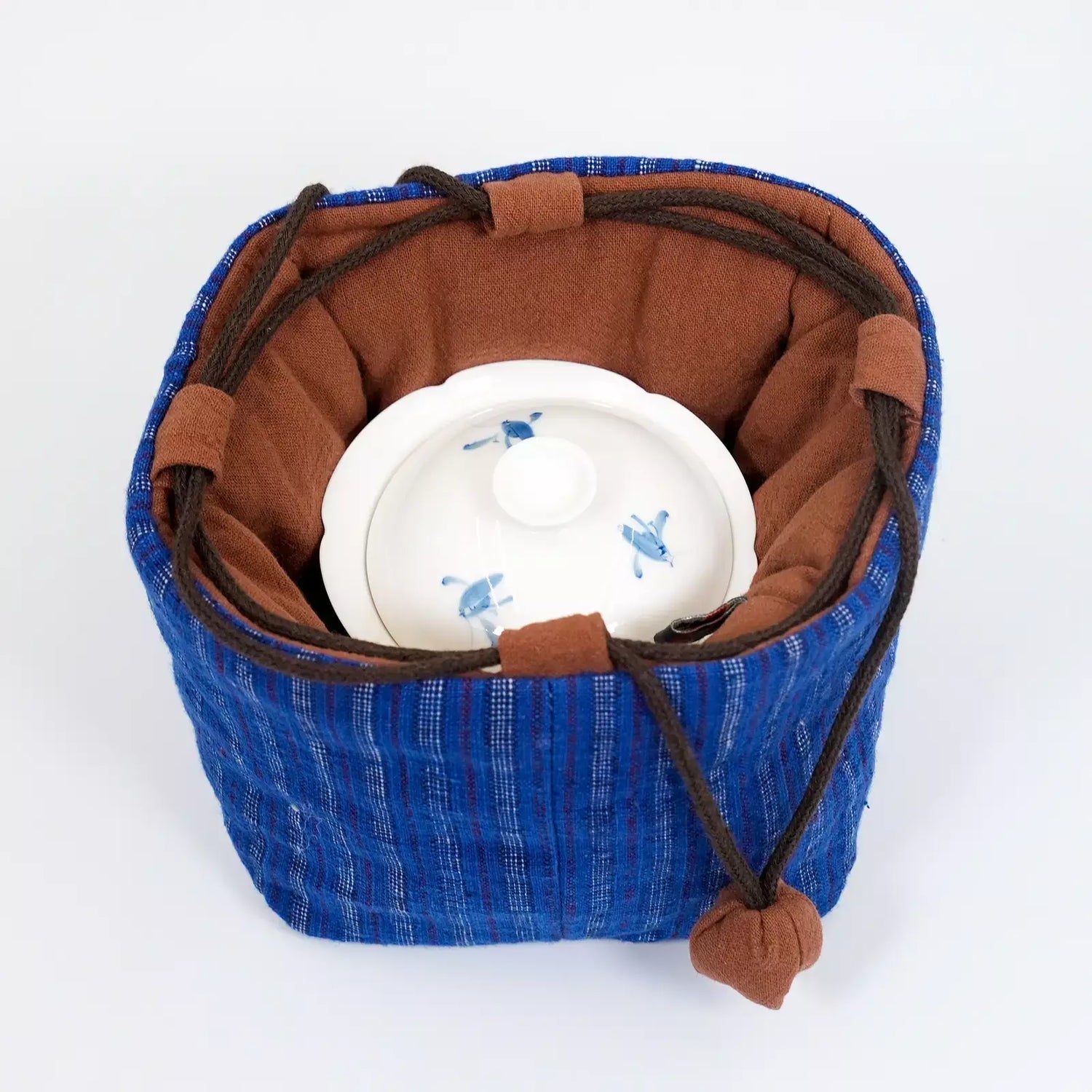
Padded Teaware Bag Sets – Protective Travel Bags for Teapots and Cups
Padded Teaware Bag Sets – Protective Travel Bags for Teapots and Cups
These teacup and teapot bag sets are specially designed to protect your teaware. Each bag is lined with soft padding that provides full cushioning and protection for teapots and cups, preventing damage from accidental bumps during handling or storage.
The sets can easily store a complete compact tea set (teapot and cups), with separate compartments for each piece to keep them secure and organized.
Available in multiple designs, these teaware bags are perfect for both home storage and travel, offering reliable protection for your favorite teapot or teacup wherever you go.
Sizes:
Teapot & Cup Bag Set (Rough Cotton / Abstract Landscape):
Large: 10 cm (L) × 10 cm (W) × 10 cm (H)
Medium: 9 cm (L) × 9 cm (W) × 9 cm (H)
Small: 7 cm (L) × 7 cm (W) × 7 cm (H)
One Teapot Fair Cup Multiple Cups Bag Set: 17 cm (L) × 13 cm (W) × 10.5 cm (H)
Lantern Bag: Round base diameter 15 cm × height 11.5 cm
One Teapot One Cup Bag Set: 14.5 cm (L) × 9 cm (W) × 9 cm (H)
*All sizes are measured by hand, and a margin of error of ±1 cm may occur.
These bag are specially designed to protect your teaware. Each bag is lined with soft padding that provides full cushioning and protection for teapots and cups, preventing damage from accidental bumps during handling or storage.
These teaware bags are perfect for both home storage and travel, offering reliable protection for your favorite teaware wherever you go.
Sizes:
Blue Persimmon Cup Bag – Tall: 5.5 cm (L) × 5.5 cm (W) × 8 cm (H)
Blue Persimmon Cup Bag – Short: 8.5 cm (L) × 8.5 cm (W) × 6 cm (H)
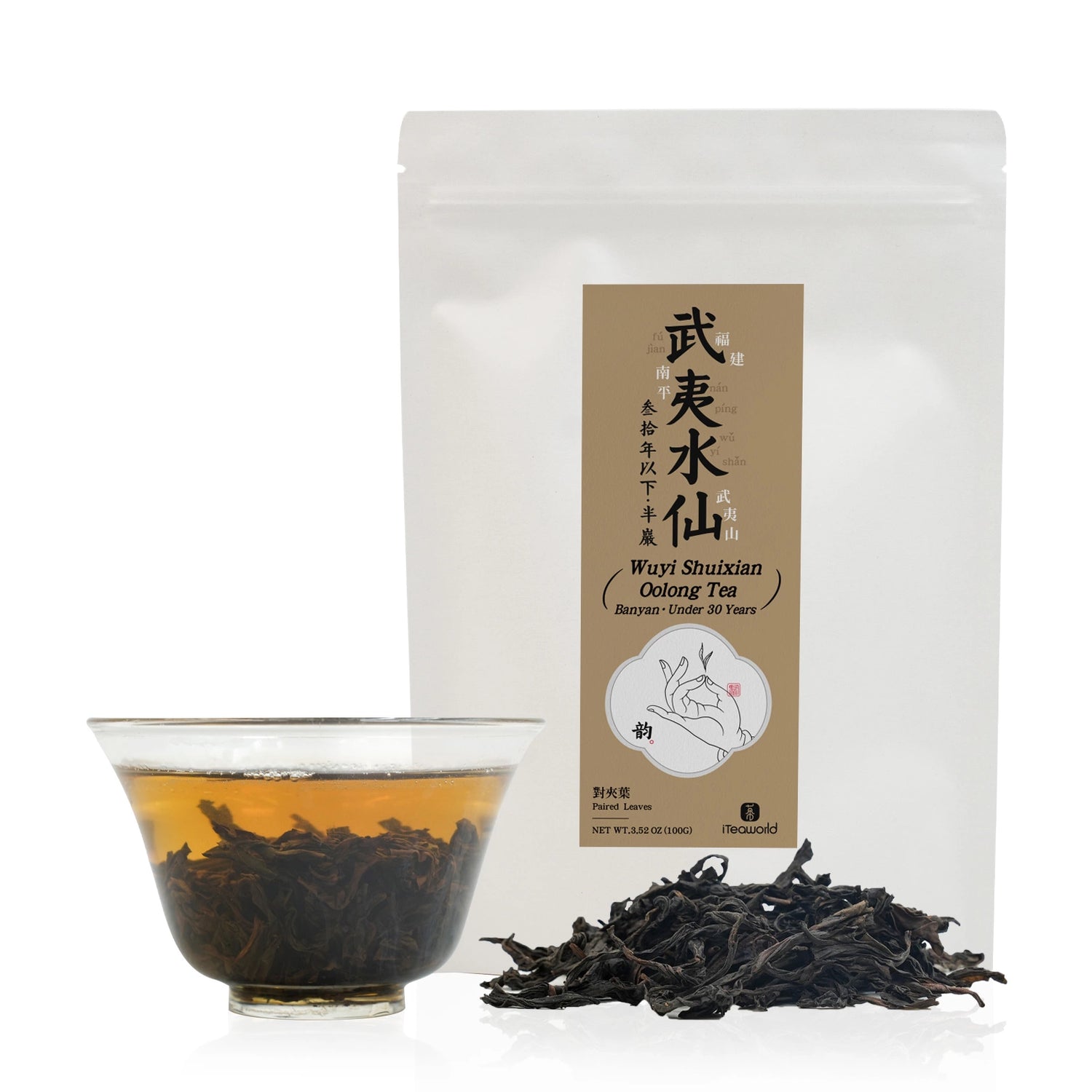
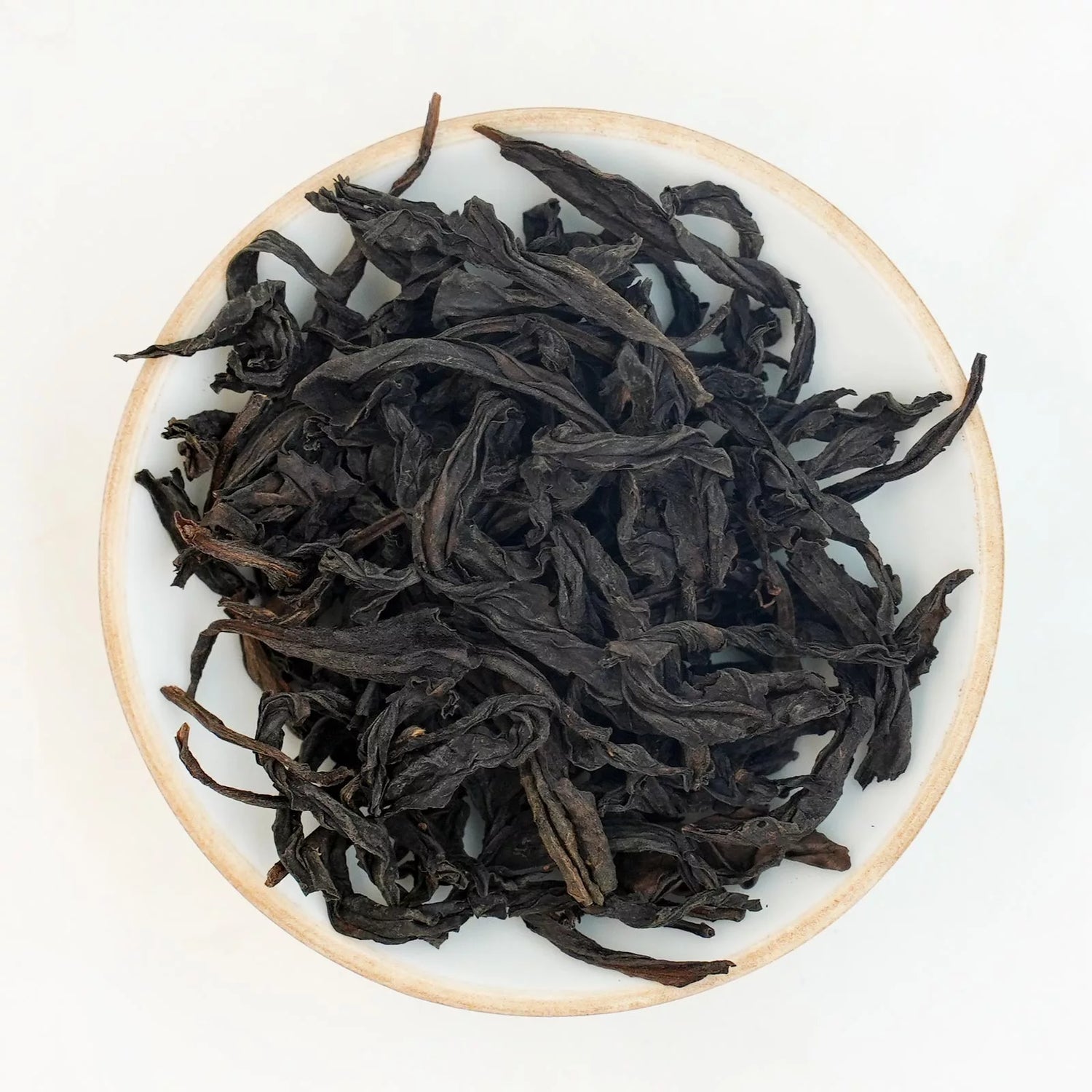
Premium Wuyi Rock Tea Wuyi Shui Xian (Ban Yan, Under 30 Years)
Premium Wuyi Rock Tea Wuyi Shui Xian (Ban Yan, Under 30 Years)
Wuyi Shui Xian is one of the signature varieties of Wuyi Rock Tea. Alongside Rou Gui, it is known by the saying: “For mellow taste, none surpasses Shui Xian; for fragrance, none surpasses Rou Gui.” Originating from Jianyang during the Qing Dynasty, Shui Xian was later introduced to Wuyi Mountain.
The age of the tea trees plays a crucial role in Shui Xian’s character. As the trees grow older, the liquor becomes more mellow, bitterness and astringency decrease, and the flavor complexity increases.
This particular Shui Xian comes from within the Wuyi Mountain Scenic Area. It belongs to the Ban Yan (mid-mountain) category, harvested from tea bushes under 30 years old (newer growth). Crafted using traditional Wuyi Rock Tea techniques, it delivers a fresh, smooth, and sweet taste. The mineral character (Yan Yun, or “rock rhyme”) is notable, with orchid fragrance as the dominant note, complemented by hints of bamboo or zongye (bamboo leaf) aroma. The tea has no heavy roasted flavor, offers 6–8 enjoyable infusions, and is an excellent choice for tea lovers wishing to further explore the world of Wuyi Rock Tea.
Origin: Jingshui Village, Xingcun Town, Wuyishan City, Fujian Province, China
Tree Age: Under 30 years
Category: Ban Yan (mid-mountain)
Soil: Gravel soil
Variety: Wuyi Shui Xian
Producer: Chen Hui
Harvest Time: November 2024
Storage Life: 36 months
Da Hong Pao is the most representative tea among Wuyi Rock Teas. Due to its high reputation, many people even refer to all Wuyi Rock Teas as Da Hong Pao. The original mother trees of Da Hong Pao are located at Jiulongke in Wuyi Mountain, and they are now strictly protected from harvesting. To recreate the unique flavor of Da Hong Pao, high-quality Wuyi Rock Teas such as Rou Gui, Shui Xian, along with pure-bred Da Hong Pao, are blended to achieve an outstanding balance of aroma, liquor color, and taste, making it a favorite among tea lovers both in China and abroad.
This Da Hong Pao is blended with mid-mountain (Ban Yan) Wuyi Rock Tea materials in a specific ratio. It has a distinctive mineral sensation (known as Yan Yun, the “rock rhyme”), with a hint of roasted fragrance. The taste is mellow and full-bodied, with every flavor harmoniously integrated. It highlights the classic character of “rock bone and floral fragrance,” offering rich layers—an excellent choice for further exploring the world of Wuyi Rock Tea.
Origin: Jingshui Village, Xingcun Town, Wuyishan City, Fujian Province, China
Altitude: 400–600 m (Ban Yan, mid-mountain)
Soil: Gravel soil
Producer: Chen Hui
Harvest Time: November 2024
Storage Life: 36 months
Brewing Guidelines
Water Temp: 100°C (212°F)
Brewware: Gaiwan, Yixing Clay Teapot
Tea-to-Water Ratio: 5-7g per 100ml
1–3 infusions: 8-15 sec
Later infusions: Add 5–10 sec
Total brews: 10-12 times
Ruixiang 305, developed by the Fujian Academy of Agricultural Sciences in 2003 from Huangdan hybrids, is one of the representative high-aroma varieties of modern Wuyi Rock Tea. It is commonly used in blends with Da Hong Pao and Wuyi Rougui to enhance aroma complexity and flavor depth.
This Ruixiang tea is processed using traditional Wuyi Rock Tea techniques. The natural gardenia-like aroma of the tea leaves is perfectly balanced with the roasted notes from charcoal firing. The fragrance is rich and long-lasting, with a pronounced cup-bottom aroma. The taste is mellow and smooth, with a lingering sweetness and layered complexity. Compared to Wuyi Rougui, it offers a fresher, more refreshing mouthfeel.
Origin:
Jingshui Village, Xingcun Town, Wuyishan City, Fujian Province, China
Tea Region:
Ban Yan
Tea Variety:
Ruixiang 305
Tea Master:
Chen Hui
Harvest Season:
November 2024
Shelf Life:
36 months
Brewing Guidelines
Water Temp: 100°C (212°F)
Brewware: Gaiwan, Yixing Clay Teapot
Tea-to-Water Ratio: 5-7g per 100ml
1–3 infusions: 8-15 sec
Later infusions: Add 5–10 sec
Total brews: 10 times


Premium Lingtou Dancong (Honey Orchid) The Everyday Honey-Sweet Oolong 100g 2025
Premium Lingtou Dancong (Honey Orchid) The Everyday Honey-Sweet Oolong 100g 2025
Lingtou Dancong | The Everyday Honey-Sweet Oolong
A smooth, affordable, and incredibly drinkable oolong with long-lasting honeyed sweetness—perfect for daily sipping and afternoon tea.
If you're looking for a "universal" tea that’s easy to love, pairs beautifully with desserts, and delivers consistent quality without breaking the bank—Lingtou Dancong is the one. Known for its mellow honey character and exceptional value, this tea could become the next “sweet icon” of Chinese tea, right after jasmine.
Tea Details
-
Cultivar: Bai Ye Dancong (White Leaf Dancong)
-
Harvest: Spring 2025
-
Origin: Lingtou Village, Fubin Town, Raoping County, Chaozhou, Guangdong
-
Elevation: 500–700m
-
Tree Age: Under 30 years
-
Roast: Traditional charcoal roast
Why You Need to Try It
-
Love sweet tea? Its thick honey note rivals most oolongs—and even some black teas.
-
Seeking value? This is one of the most affordable yet flavorful Dancong oolongs.
-
Exploring the diversity of Guangdong oolong? Lingtou is a classic, but outside the better-known Phoenix Dancong system.
Origin & Story: Sweetness Born in the Mountains
Lingtou Dancong, also called Bai Ye Dancong (White Leaf Dancong), comes from Lingtou Village in Raoping County, Chaozhou, Guangdong. First cultivated in 1961, it was selected from wild Phoenix Shui Xian trees and now accounts for over 50% of tea garden area in Guangdong.
-
Cultivar: Small-tree, large-leaf type
-
Elevation: 500–700m
-
Soil: Mountain red clay with good drainage
-
Climate: Warm, misty, ideal for floral and honey aroma development
Flavor Profile: Rich Honey, Soft Floral, Easy to Love
Lingtou Dancong offers a bright, golden infusion with high floral aroma and a distinctive “mi yun” (honey rhyme)—a signature note prized by Chaozhou tea drinkers. It’s:
-
Sweet and smooth, never bitter
-
Medium-thick in body, with a lingering aftertaste
-
Great for pairing with pastries, fruit, or just a peaceful afternoon
Flavor Comparison:
-
Lingtou Mi Lan Xiang (Honey Orchid): Emphasizes honey, subtle florals
-
Phoenix Mi Lan Xiang: Emphasizes orchid, with lighter honey undertone
“A honey-sweet tea you can drink every day and never get tired of.”
Brewing Recommendations
Gongfu Style:
-
5g per 100ml gaiwan
-
95-100°C water
-
Quick rinse, then infuse 6–8+ times starting from 10 seconds
Western Brewing:
-
2g per 200ml
-
Steep at 95–100°C for 1–3 minutes
-
Can re-steep 2–3 times
-
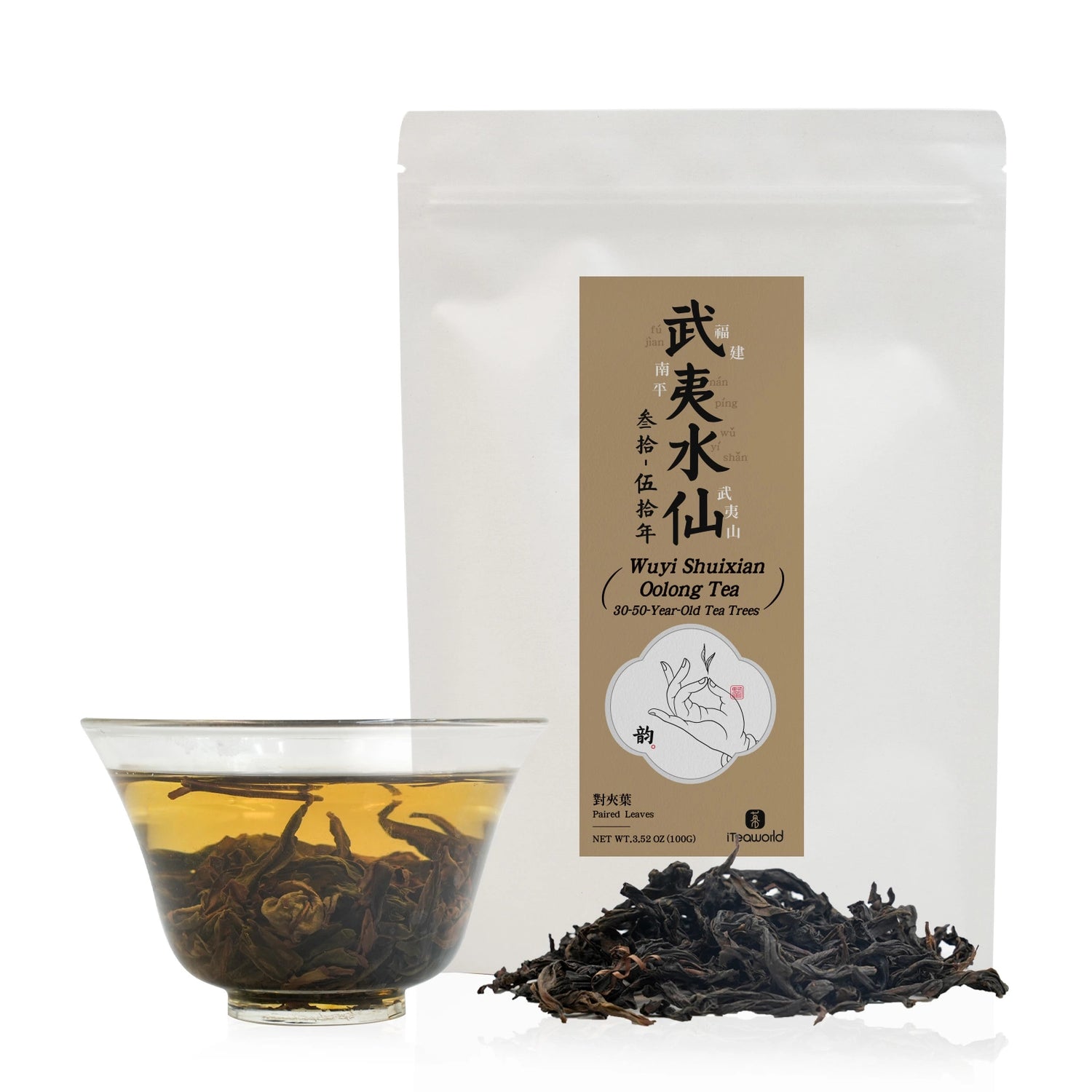
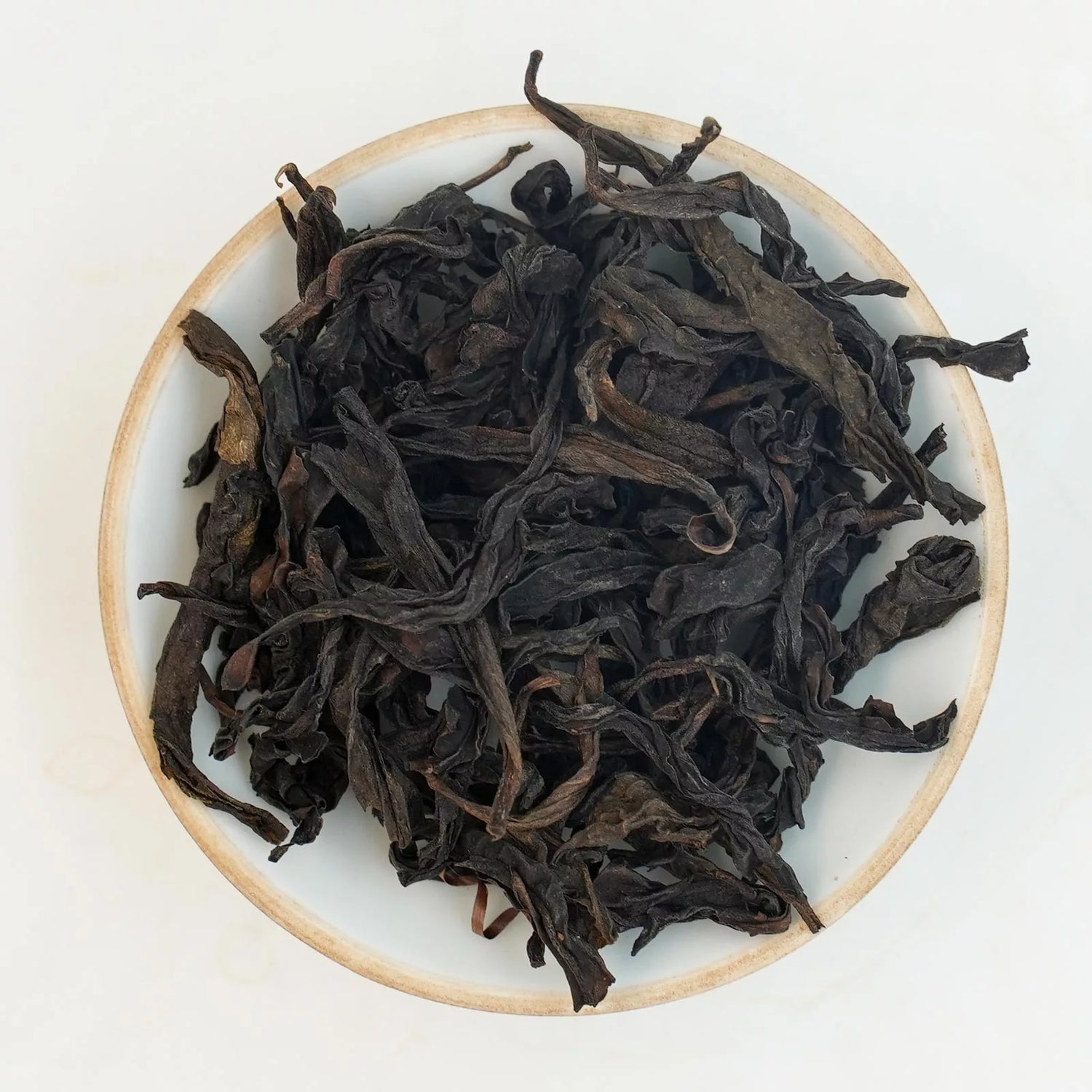
Jian’ou Wuyi Shui Xian (High Mountain, 30-50 years Old Bush) Oolong for Daily 2025
Jian’ou Wuyi Shui Xian (High Mountain, 30-50 years Old Bush) Oolong for Daily 2025
Wuyi Shui Xian (High Mountain, Old Bush)
Wuyi Shui Xian is one of the signature cultivars of Wuyi rock oolong. it combines rich floral aroma with a thick, velvety liquor. Originating in the Qing dynasty, Shui Xian is the only semi-arbor cultivar among Wuyi teas. Old bush (lao cong) trees—typically 50+ years—produce deeper, smoother infusions with forest-like clarity, woodsy depth, and signature “cong” flavor. Compared to newer bushes, old trees yield higher amino acids and lower bitterness, making them more enduring in brews and suitable for medium charcoal roast.
This tea is sourced from Baizhang Village in Xiaoqiao Town, just outside the Wuyishan core scenic area. With a 1,000-year legacy of tea production and imperial tribute history, Baizhang sits at 730m elevation in the southeast Wuyi Mountains. The terroir—constant mist, gravelly soil, and rich minerals—creates optimal conditions for deep, layered teas at a more accessible price point.
We compared several Shui Xian teas from within the Wuyi core and selected this high-mountain, old-bush version for its mature flavor, authentic craftsmanship, and outstanding value. With a taste profile reminiscent of 40–50-year-style Shui Xian, this tea is not only beginner-friendly but also worthy of daily storage and long-term appreciation by seasoned drinkers.
Origin: Baizhang Village, Xiaoqiao Town, Jian ou City, Fujian, China | Elevation: 730m
Roasting: Traditional charcoal roasting
Tea Maker: Zheng Xiongqing, veteran tea artisan from a multi-generation tea family
Cultivar: Shui Xian (approx. 30-50 year-old bushes)
Harvest: Spring 2025
Oxidation: Medium (40–50%)
Roast: Medium (charcoal roasted)
Suitable for: Daily drinking, mellow-flavor lovers, aged bush oolong enthusiasts
Shelf Life & Storage
Shelf Life: 5+ years (aging possible but not required)
Storage: Store in an airtight container in a cool, dry, odor-free place. No refrigeration needed. For longer-term storage, avoid frequent air exposure.
Brewing Guidelines
-
Vessel: Porcelain gaiwan or clay teapot
-
Water: 5g tea : 100ml spring or filtered water | 100°C / 212°F
-
Steeping:
-
Infusions 1–3: 10–15 seconds
-
Add 5–7 seconds per infusion thereafter
-
Yields 8–10 infusions
-
Flavor Profile
-
Aroma: Toasted wood, orchid, subtle aged sweetness
-
Taste: Smooth and clean, with soft florals, wood, and a gentle roasted finish
-
Mouthfeel: Round and mellow, light astringency
-
Aftertaste: Light and lasting, with a comforting warmth; “rock rhyme” (Yan Yun) is subtle
Best Enjoyed When...
-
You prefer a softer, more approachable Wuyi oolong
-
You want a daily tea with the depth of older bushes
-
You’re exploring non-Zhengyan teas with high value and honest craftsmanship
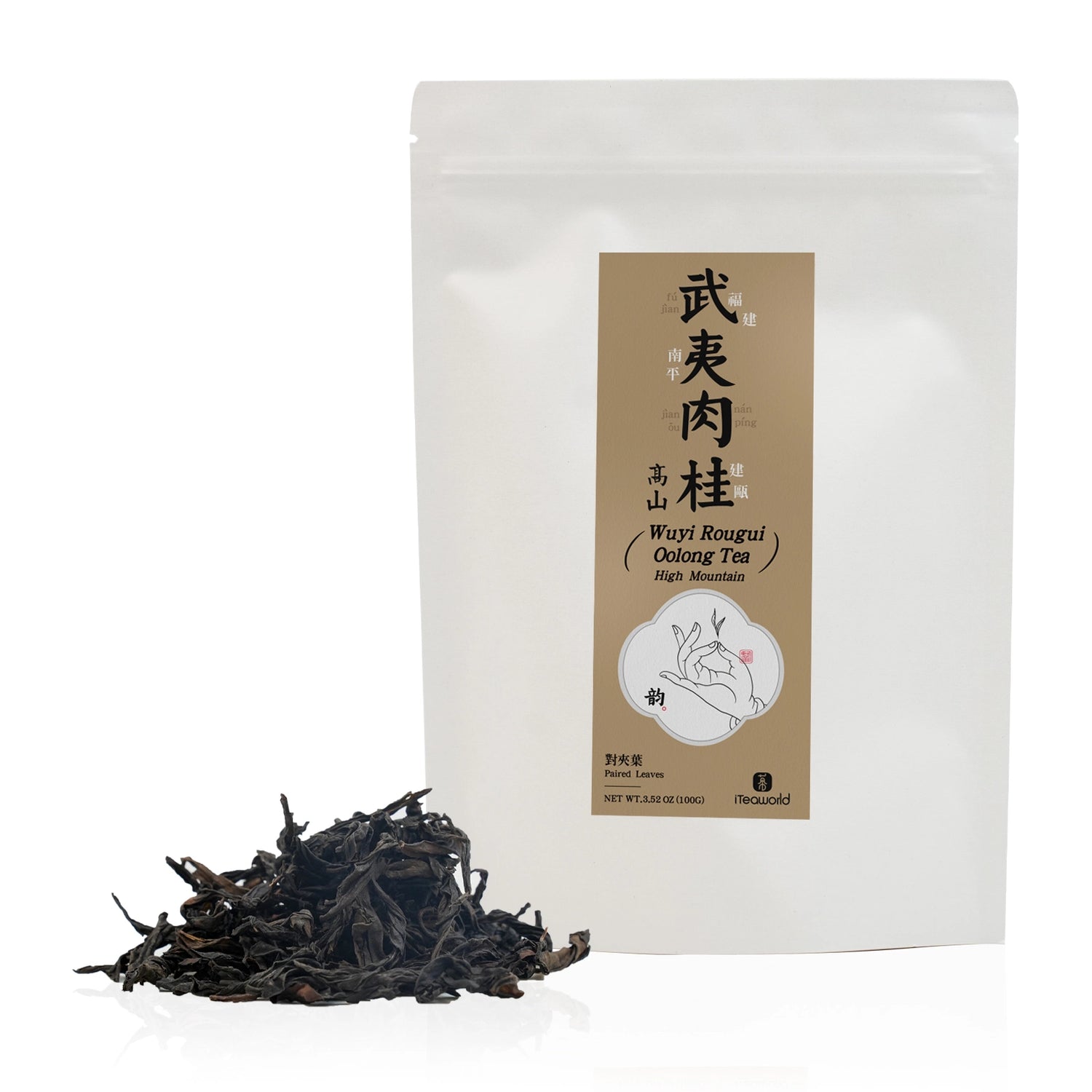

Jian’ou Wuyi Rou Gui (High Mountain) Oolong – Daily Friendly(Spring 2025)
Jian’ou Wuyi Rou Gui (High Mountain) Oolong – Daily Friendly(Spring 2025)
Wuyi Rou Gui (High Mountain Cinnamon Rock Oolong) | 武夷高山肉桂
Introduction
Rou Gui is one of the most iconic Wuyi rock oolongs, known for its bold, spicy character and its signature cinnamon-like aroma. Grown in rocky, mineral-rich soils and charcoal-roasted to perfection, it delivers a complex, full-bodied cup with layered notes of roasted spice, dark fruit, and wet stone.
This tea is sourced from Baizhang Village in Xiaoqiao Town, located just outside the Wuyishan core scenic area. Though not within the official “Zheng Yan” zone, Baizhang boasts over 1,000 years of tea-making history and was once a producer of imperial tribute teas. At 730m elevation, its high-mountain terroir—misty climate, sandy-gravel soils, and rich mineral content—meets the classic criteria for producing exceptional rock oolong at outstanding value.
After extensive tasting of Rou Gui from across Wuyi’s top areas, we selected this tea for its exceptional balance of flavor, structure, and price—making it our top choice for a daily drinking Rou Gui with true character.
This tea was freshly roasted on September 3 and is recommended to be stored for a period of time before drinking.
Why shouldn’t freshly roasted Oolong tea be consumed right away?
Right after roasting, the tea has a strong charcoal aroma that can mask its natural fragrance and flavor. It also retains a certain “fiery” quality — caffeine and tea polyphenols remain high, making the taste slightly harsh or astringent and potentially irritating to the throat or stomach. Drinking it too soon can also lead to a feeling of internal heat, especially for those prone to “heatiness” or during dry seasons, known in traditional Chinese medicine as “shang huo” (excess internal heat). These symptoms quickly subside once consumption stops.
To avoid discomfort, let the tea rest before drinking. This allows the fire taste to fade (“tui huo”) and the tea’s components to stabilize. Once rested, the tea becomes smoother and more balanced in both aroma and flavor. Lightly roasted teas need about 1–2 months to rest, while medium to heavily roasted ones require around 6 months.
Origin: Baizhang Village, Xiaoqiao Town, Jianou City, Fujian, China | 730m
Roasting: Traditional charcoal roasting (briquetting method)
Tea Maker: Zheng Xiongqing, veteran tea artisan from a multi-generation tea-making family
Cultivar: Rou Gui
Harvest: 2025 (Spring)
Oxidation: Medium-high (50–60%)
Roast: Medium-Heavy (charcoal roasted)
Shelf Life: 3 years
Storage: Store in an airtight container in a cool, dry, odor-free place. For longer storage or to encourage aging, avoid frequent air exposure.
Brewing
-
Vessel: Porcelain gaiwan / clay teapot
-
Water: 100ml spring/pure water : 5g tea | 100°C / 212°F
-
Steeping:
-
1st–3rd infusions: 10–15 seconds
-
Subsequent infusions: Add 5–7 seconds each round
-
Suitable for up to 8–10 infusions
-
Flavor
-
Aroma: Roasted spice, cinnamon, mineral-rich
-
Taste: Bold and warming, with dark fruit and rock minerality
-
Mouthfeel: Thick, structured, with long-lasting resonance
-
Aftertaste: Lingering “rock rhyme” (岩韵) with spicy finish
Occasions
-
Morning focus (stimulating and grounding)
-
Post-meal clarity (cuts through heaviness)
-
Ideal daily Wuyi oolong for bold flavor lovers
Recently viewed products
Chat with fellow tea lovers, ask questions, and share your tea moments.
Chat with fellow tea lovers, ask questions, and share your tea moments.





